

Top 200+ Engaging Culture Research Topics: Ideas to Explore
Culture is all about the beliefs, traditions, art, and ways of living that make up different groups of people worldwide. Cultural studies open up interesting paths for learning. Researchers can explore how people express themselves, their identity, and their interactions.
Cultural research gives a view into our diverse world, whether studying traditions over time, how cultures mix, or the impacts of globalization. This blog lists the top 200+ engaging cultural research topics from varied topics and perspectives to excite researchers, students, and anyone interested in exploring questions that highlight human cultural diversity.
Studying culture covers art, stories, social rules, beliefs, and how communities shape their environments. By exploring cultural research, we gain insights into shared experiences, histories, and worldviews that unite people and cultural uniqueness.
Researchers untangle complex threads weaving a culture’s identity and meaning through expressions like religion, language, food, and art.
As our world interconnects, understanding cultural differences grows important. Digging into these areas builds cross-cultural understanding, appreciates diverse views, and works towards inclusive societies.
This blog explores potential research paths, encouraging scholars and students to take learning journeys highlighting the rich tapestry of human cultures.
How Does Culture Impact Various Aspects Of Society?
Table of Contents
Culture deeply affects nearly every part of society. It influences how we interact, build communities, govern, teach, create art, approach healthcare, and make economic choices. Understanding the role of culture is key to analyzing social issues and dynamics.
- Social Rules and Beliefs
Culture lays the foundation for the shared beliefs, attitudes, and behaviors that define what is considered okay or not okay within a society. It shapes gender roles, communication styles, concepts of privacy, rules of politeness, and moral principles.
- Family and Relatives
Cultural traditions largely decide family structures, parenting styles, marriage practices, and generational relationships. Rituals surrounding birth, becoming an adult, marriage, and death are deeply rooted in culture.
- Education Systems
Cultural contexts and education philosophies heavily influence the subjects taught, teaching methods, classroom setup, grading approaches, and even the idea of learning itself.
- Religious and Spiritual Beliefs
Culture and religion are closely linked, with faith and spiritual practices playing a profound role in an individual’s identity, worldview, ethics, and community connections.
- Art and Stories
Creative expression through art, music, dance, folklore, and literature reflects a culture’s collective identity, history, and artistic values passed down over generations.
- Food and Eating
Food is intimately tied to culture, with food traditions, ingredients, cooking methods, and dining customs reflecting agricultural practices, values, and social hierarchies.
- Health and Medicine
Cultural backgrounds shape attitudes towards physical and mental health, preferred treatment methods, views on the human body, and institutional structures around healthcare delivery.
By understanding how culture underpins so many areas of society, we gain critical insights into resolving conflicts, bridging gaps between communities, and creating policies and initiatives that resonate across all groups of people.
Topical Diversity in Culture Research
Cultural research covers various fascinating topics and angles that give us insight into human societies worldwide. Researchers explore everything from the arts and traditions to belief systems, languages, social structures, etc.
Exploring Various Sides of Culture
- Art and Creative Expression (music, dance, stories, visual arts, theater, etc.)
- Traditions and Customs (holidays, rituals, milestone celebrations, folk practices)
- Food and Eating Ways (ingredients, cooking methods, dining customs)
- Language and Communication Styles
- Clothing and Decorative Styles
- Social Rules and Value Systems
- Gender Roles and Family Structures
- Spiritual and Religious Beliefs
- Cultural Identity and Sense of Belonging
Different Ways to Study Culture
- On-the-Ground Research: Observing and documenting cultural practices and perspectives firsthand by living in the community
- Historical and Archaeological Study: Examining artifacts, records, and evidence to understand cultural evolution
- Comparing Cultures: Identifying similarities and differences across cultures.
- Sociological and Anthropological Views: Studying cultures through theoretical frameworks
- Mixed Methods: Combining insights from fields like psychology, linguistics, economics, and more
- Personal Stories and Oral Histories: Exploring culture through first-hand accounts and stories
- Digital Research: Researching cultures and communities online and in digital spaces
By considering the diverse topics and varied approaches, cultural researchers gain a multi-angle understanding of the rich tapestry of human experience worldwide.
Recommended Readings: “ Top 201+ Narrative Project Ideas To Spark Your Creativity! “.
Top 200+ Culture Research Topics For Students
Here is the list of the top 200+ culture research topics, provided in different categories; let’s look.
Arts and Literature
- Evolution of modern art movements.
- Impact of digital technology on literature.
- Representation of gender in classical literature.
- Role of art in social change movements.
- Cultural significance of traditional folk music.
- Influence of literature on societal norms.
- The intersection of art and politics.
- Comparative analysis of different art forms.
- Cultural implications of street art.
- Depiction of war in literature and art.
Media and Communication
- Effects of social media on cultural identity.
- The portrayal of race and ethnicity in mainstream media.
- The role of memes in contemporary culture.
- Influence of advertising on consumer behavior.
- Evolution of journalism in the digital age.
- Cultural impact of reality TV shows.
- Representation of the LGBTQ+ community in media.
- Cultural appropriation in fashion and media.
- Role of censorship in shaping cultural narratives.
- The rise of streaming services and cultural consumption.
Language and Linguistics
- Evolution of slang and its impact on language.
- Language revitalization efforts and their effectiveness.
- Influence of colonialism on indigenous languages.
- Sociolinguistic variations in different cultures.
- Language acquisition in multicultural societies.
- Impact of globalization on language diversity.
- Language and identity formation.
- Cultural implications of bilingualism.
- Role of language in preserving cultural heritage.
- Linguistic relativity and cultural cognition.
Religion and Belief Systems
- Rituals and ceremonies in different religions.
- The role of religion in shaping moral values.
- Impact of globalization on religious practices.
- Interfaith dialogue and cultural understanding.
- Evolution of religious art and architecture.
- Influence of religion on political ideologies.
- Religious syncretism and cultural fusion.
- Sacred texts and their interpretation across cultures.
- Secularization and its effects on cultural norms.
- Religion and cultural conflicts throughout history.
History and Heritage
- Cultural impact of colonialism and imperialism.
- Oral history and its role in preserving culture.
- Cultural significance of historical monuments.
- Impact of migration on cultural identity.
- Evolution of family structures over time.
- Cultural exchange along ancient trade routes.
- Archaeological discoveries and cultural insights.
- Cultural legacy of ancient civilizations.
- Historical trauma and its effects on culture.
- Preservation of intangible cultural heritage.
Sociology and Anthropology
- Cultural differences in concepts of beauty.
- Social hierarchies and cultural stratification.
- Cultural perceptions of mental health.
- Gender roles and expectations in different cultures.
- Cultural aspects of food and culinary traditions.
- Rituals surrounding birth, marriage, and death.
- Cultural expressions of love and intimacy.
- Impact of globalization on cultural homogenization.
- Cultural practices related to education.
- Cross-cultural communication and misunderstandings.
Politics and Governance
- Cultural factors influencing voting behavior.
- Nationalism and its impact on cultural identity.
- Cultural diplomacy and soft power.
- Role of culture in international relations.
- Cultural policies and government funding.
- Indigenous rights and cultural preservation.
- Cultural dimensions of conflict resolution.
- Impact of authoritarian regimes on culture.
- Cultural movements and political activism.
- Cultural implications of refugee crises.
Technology and Innovation
- Cultural attitudes towards emerging technologies.
- Digital divides and cultural disparities.
- Cultural appropriation in technology design.
- Impact of AI on cultural production.
- Virtual reality and cultural experiences.
- Ethical considerations in technological advancements.
- Technological innovations in cultural preservation.
- Cultural resistance to technological change.
- Cultural implications of genetic engineering.
- Technological determinism and cultural evolution.
Education and Learning
- Culturally relevant pedagogy in education.
- Indigenous knowledge systems in education.
- Role of cultural competence in teaching.
- Cultural factors influencing learning styles.
- Education and cultural reproduction.
- Multicultural education and curriculum development.
- Cultural barriers to access education.
- Language diversity in educational settings.
- Cultural perspectives on childhood and adolescence.
- Impact of globalization on educational systems.
Identity and Diversity
- Intersectionality and cultural identity.
- Cultural assimilation versus cultural preservation.
- Cultural hybridity and identity negotiation.
- Cultural stereotypes and their impact.
- Cultural identity and belonging in diaspora communities.
- Cultural representations of disability.
- LGBTQ+ rights and cultural acceptance.
- Cultural dimensions of age and aging.
- Cultural perceptions of beauty standards.
- Ethnocentrism and cultural relativism.
Environment and Sustainability
- Indigenous perspectives on environmental stewardship.
- Cultural attitudes towards climate change.
- Impact of consumer culture on the environment.
- Traditional ecological knowledge and conservation.
- Cultural practices promoting sustainability.
- Environmental justice and cultural disparities.
- Cultural dimensions of food security.
- Indigenous land rights and cultural survival.
- Cultural influences on consumption patterns.
- Eco-tourism and cultural exchange.
Health and Wellness
- Cultural variations in healthcare practices.
- Traditional medicine and cultural beliefs.
- The stigma surrounding mental health in different cultures.
- Cultural factors influencing diet and nutrition.
- Cultural representations of illness and disability.
- Cultural rituals related to healing and well-being.
- Access to healthcare in diverse cultural contexts.
- Cultural attitudes towards body image and health.
- End-of-life care and cultural practices.
- Cultural barriers to health education and promotion.
Migration and Transnationalism
- Cultural adaptation and acculturation processes.
- Transnational communities and cultural exchange.
- Impact of remittances on cultural dynamics.
- Diaspora identities and cultural preservation.
- Cultural challenges faced by immigrants.
- Cultural hybridization in multicultural societies.
- Cultural dimensions of refugee resettlement.
- Transnational media and its cultural effects.
- Cultural nostalgia and longing in migrant communities.
- Cultural integration policies and their effectiveness.
Economics and Globalization
- Cultural dimensions of economic development.
- Globalization and cultural homogenization.
- Cultural branding and marketing strategies.
- Cultural industries and creative economies.
- Cultural value chains and commodification.
- Cultural entrepreneurship and innovation.
- Cultural tourism and economic impact.
- Intellectual property rights and cultural heritage.
- Global supply chains and cultural production.
- Cultural implications of income inequality.
Leisure and Recreation
- Cultural significance of sports and games.
- Festivals and celebrations across cultures.
- Cultural norms surrounding leisure activities.
- Tourism and cultural authenticity.
- Cultural representations in entertainment media.
- Indigenous forms of entertainment and recreation.
- Cultural rituals of relaxation and rejuvenation.
- Impact of technology on leisure habits.
- Cultural perspectives on outdoor recreation.
- The role of leisure in community building.
Family and Kinship
- Cultural variations in family structures.
- Cultural expectations of parenthood.
- Intergenerational transmission of cultural values.
- Cultural rituals surrounding marriage and partnership.
- Cultural attitudes towards child-rearing.
- Kinship systems and cultural identity.
- Cultural perceptions of caregiving.
- Family dynamics in multicultural households.
- Cultural practices related to eldercare.
- Cultural representations of family in media.
Urbanization and Urban Culture
- Cultural diversity in urban environments.
- Urbanization and the erosion of traditional culture.
- Cultural gentrification and displacement.
- Street art and graffiti as cultural expressions.
- Cultural communities within urban spaces.
- Urban legends and folklore.
- Cultural aspects of urban planning.
- Impact of migration on urban culture.
- Cultural revitalization projects in cities.
- Subcultures and countercultures in urban settings.
Governance and Policy
- Cultural rights and human rights discourse.
- Multiculturalism policies and their effectiveness.
- Cultural diplomacy in international relations.
- Cultural heritage preservation laws.
- Indigenous land rights and sovereignty.
- Cultural dimensions of public policy.
- Cultural sensitivity training in government.
- Cultural impact assessments in policy-making.
- Cultural representation in political institutions.
- Cultural heritage protection in conflict zones.
Memory and Commemoration
- Cultural memory and collective trauma.
- Commemorative practices and cultural identity.
- Museums and cultural representation.
- Oral history projects and cultural preservation.
- Memorialization of historical events.
- Cultural heritage sites and tourism.
- Digital archives and cultural heritage.
- Cultural monuments and their meanings.
- Cultural responses to historical revisionism.
- Rituals of remembrance in different cultures.
Cultural Capital and Social Mobility
- Cultural capital and its role in social stratification.
- Cultural barriers to upward mobility.
- Cultural capital and educational attainment.
- Cultural capital and access to resources.
- Cultural capital and employment opportunities.
- Cultural dimensions of social capital.
- Cultural capital and political participation.
- Cultural mobility and globalization.
- Intergenerational transmission of cultural capital.
- Cultural capital and urban development.
- Cultural capital and well-being outcomes.
These topics cover various cultural aspects and can be a starting point for further research and exploration.
Tips For Choosing the Right Culture Research Topic
Picking a good topic is super important when researching culture. The topic you choose decides what your whole project will be about. If you pick the wrong topic, you might get bored or not learn anything useful.
But if you pick a cultural topic that interests you, your research will be more fun and valuable. With so many fascinating cultural issues, choosing just one to study can feel overwhelming. But by considering a few key points, you can find the perfect research topic that fits your interests, goals, and resources as a cultural researcher.
- Pick a topic you’re genuinely interested in and passionate about. Your enthusiasm will make the research process much more engaging.
- Consider cultural issues or phenomena that puzzle you, or you’ve personally experienced and want to understand better.
- Look for gaps in existing research on cultural topics. Identifying an understudied area can make your work more novel and valuable.
- Think about the practical applications of your research. Work that provides insights into reducing cultural misunderstandings or conflicts can greatly impact.
- Choose a topic that is narrow enough to explore in-depth within the scope of your project yet still broadly relevant.
- For a cross-cultural study, select cultures that provide an interesting contrast to compare and analyze.
- Ensure you have access to the necessary data sources, whether archival materials, interview subjects, survey populations, etc.
- Consider the ethical implications of your research, especially if studying vulnerable populations. Prioritize, not harm.
The right topic sparks your curiosity, fills a need, and is feasible to execute thoroughly and responsibly with your resources.
Trends To Come in Culture Research
Researchers are looking at lots of new and interesting cultural topics these days. Here are some of the latest areas scholars are studying when it comes to culture:
Culture and Technology Research Topics
- How social media is changing cultural values and norms
- Comparing how different cultures use and adopt new technologies
- Whether technology helps preserve cultural traditions or makes them disappear
- The rise of global digital cultures and subcultures online
- Cultural impacts of artificial intelligence and automation
Environmental Culture Research Topics
- What indigenous cultures know about living sustainably in the environment
- How climate change is affecting cultural practices and traditions
- Where environmental justice and cultural identity overlap
- The role culture plays in environmental-friendly (or unfriendly) behaviors
- Different cultural views on humanity’s relationship with nature
Contemporary Cultural Issues Research Topics
- Cultural experiences of immigrants, migrants, and refugees
- How popular culture (movies, TV, music, etc.) shapes cultural attitudes
- The cultural side of social movements like #MeToo, Black Lives Matter, LGBTQ+ rights
- Impacts of globalization on mixing and blending cultures
- How culture factors into political conflicts and clashing worldviews
These new and emerging cultural topics give researchers a chance to learn things that are very relevant to today’s world.
How can I choose the right culture research topic?
Consider your interests, societal relevance, and the availability of resources. Choose a topic that resonates with you and contributes to existing discourse.
Are there any ethical considerations in cultural research?
Researchers must respect cultural sensitivities, obtain informed consent, and avoid misrepresenting or exploiting cultural practices.
Can I conduct cross-cultural research as an undergraduate student?
Absolutely! Cross-cultural research offers valuable insights and can be conducted at various academic levels with proper guidance and supervision.
Similar Articles

How To Do Homework Fast – 11 Tips To Do Homework Fast
Homework is one of the most important parts that have to be done by students. It has been around for…

How to Write an Assignment Introduction – 6 Best Tips
In essence, the writing tasks in academic tenure students are an integral part of any curriculum. Whether in high school,…
Leave a Comment Cancel Reply
Your email address will not be published. Required fields are marked *
This site uses Akismet to reduce spam. Learn how your comment data is processed .
373 Culture Research Topics & Ideas for Essays and Papers
18 January 2024
last updated
Culture research topics include various human behaviors and beliefs, offering a deep dive into societal norms, values, traditions, and symbols that have shaped and continue to shape civilizations across time and space. Themes encompass many areas, such as linguistics, anthropology, sociology, psychology, history, and arts. Topics also may include investigating the effects of globalization on indigenous cultures, the role of pop culture in shaping societal values, impacts of cultural assimilation, or tracing the evolution of language in a particular region. Studies in this field illuminate the tapestry of human existence, providing rich insights into unique human histories. Thus, culture research topics are not only intrinsically fascinating but also have crucial implications for policy, education, and understanding of identity, community, and coexistence in an increasingly diverse and interconnected world.
Hot Cultural Topics
- Unearthing Indigenous Histories Through Technology
- Cryptocurrency’s Influence on Art and Culture
- Ethical Dilemmas in Genomic Data Sharing
- The Intersection of Environmentalism and Fashion Trends
- Debating Authenticity in Social Media Influencer Culture
- Exploring Minority Representation in Hollywood
- Augmented Reality as a Cultural Experience
- Redefining Gender Norms in Video Gaming
- Street Art as a Political Commentary
- Future of Libraries in the Digital Age
- Culinary Trends Sparked by Plant-Based Movements
- Cultural Shifts in Privacy Perception Post-Social Media
- Language Preservation in a Globalized World
- AI and the Transformation of Creative Industries
- Mental Health Narratives in Popular Music
- Eco-Cities: Blending Urbanism and Sustainability
- Cross-Cultural Understanding Through Travel During Pandemic
- Consumerism and Minimalism: Contrasting Cultural Phenomena
- Unconventional Family Structures in Contemporary Literature
- Futurism in Architectural Design and Cultural Identity

Easy Cultural Essay Topics
- Influence of Digital Art on Cultural Identity
- Food Traditions as Cultural Symbols
- Relationship Between Language and Cultural Heritage
- Rise of E-Sports and Its Cultural Significance
- Virtual Reality in the Realm of Cultural Preservation
- Social Media as a Tool for Cultural Exchange
- Influence of Climate Change on Cultural Practices
- Anime and Manga: Japanese Culture’s Global Reach
- Cultural Perception of Privacy in the Era of Big Data
- Reality TV’s Effect on Cultural Stereotypes
- Cultural Implications of Urban Green Spaces
- Nostalgia and Culture in Retro Fashion Trends
- Understanding Cultural Context in Classic Literature
- Cultural Diversity in Modern Cinema
- Significance of Cultural Festivals in Building Community
- Influence of Sci-Fi on Our Perception of Future Cultures
- Cultural Perspectives on Mental Health in Popular Literature
- Globalization’s Effect on Indigenous Cultures
- Street Food and Its Connection to Local Culture
Interesting Culture Topics to Research for Essays and Papers
- Maori Culture and Traditions
- Intricacies of Japanese Tea Ceremony
- Voodoo Practices in Haitian Culture
- Celtic Traditions and Mythology
- Arab Bedouin Traditions and Nomadic Lifestyle
- Native American Tribes and Their Cultural Diversity
- Balinese Rituals and Spiritual Practices
- The Complexity of Tibetan Buddhism
- Greek Orthodox Customs and Traditions
- Culture of the Sami People in Scandinavia
- Andean Cultures: Incas and Their Descendants
- Mayan Civilization: Ancient Practices and Beliefs
- Yoruba Religion and Cultural Traditions in West Africa
- Nomadic Culture of the Mongolian Steppes
- Diverse Cultural Practices of Australian Aboriginals
- Culture of the Maasai Tribes in East Africa
- Persian Poetry and Its Cultural Significance
- Dance Forms and Culture of Polynesian Islands
- Cultures of the Amazon Rainforest Tribes
- Korean Hanbok and Traditional Dress Culture
Cultural Anthropology Topics for a Research Paper
- Decoding Symbolism in Ancient Mayan Art
- Understanding Power Structures in Tribal Societies
- Exploring Ritualistic Practices of the Australian Aborigines
- Influence of Globalization on Indigenous Cultural Practices
- Rituals and Customs: A Comparative Study Between Maasai and Zulu Tribes
- Investigating Linguistic Diversity in the Amazon Rainforest
- Dynamics of Cultural Adaptation in Refugee Communities
- Indigenous Knowledge and Biodiversity Conservation
- Comparative Study of Death Rituals Across Cultures
- Cultural Contexts of Folklore and Mythology in Slavic Societies
- Digital Anthropology: Social Media and Cultural Practices
- Cultural Perspectives on Gender and Sexuality in Pacific Island Societies
- Transcultural Psychiatry: Mental Health Across Cultures
- Insights into Cultural Healing Practices of Native American Tribes
- Foodways and Culture: A Study of Mediterranean Societies
- Dynamics of Social Change in Post-Colonial Societies
- Material Culture: Analysis of Ancient Egyptian Artifacts
- Cultural Interpretations of Climate Change in Arctic Communities
- Cultural Factors in Public Health: A Case Study of Sub-Saharan Africa
- Sacred Spaces and Cultural Identity: An Exploration of Hindu Temples
Cultural Criticism Essay Topics
- Postmodernism and Cultural Representation in Media
- Interrogating Orientalism: Western Perception of Eastern Cultures
- Deconstructing the Beauty Standard in Pop Culture
- Eco-Criticism and Interpretation of Environmental Narratives
- Analyzing Power Structures in Classic Literature
- Cultural Bias in Artificial Intelligence Systems
- Culture and Censorship: Freedom of Expression in Various Societies
- Unpacking Gender Stereotypes in Advertising
- Culture of Fear: Media Representation of Terrorism
- Colonial Narratives and Indigenous Voices in History Textbooks
- Cyber Culture: The Dark Side of Online Communities
- Cultural Appropriation vs. Appreciation: A Thin Line
- Cultural Hegemony and Minority Representation in Film Industry
- Ethnocentrism in Anthropological Research: A Critique
- Understanding Whiteness: Critique of White Privilege
- Body Image and Self-Esteem: A Critique of the Fashion Industry
- Religion and Cultural Bias in Western Feminist Discourses
- Consumer Culture and Critique of Fast Fashion
- Mental Health Stigma: Cultural Perspectives and Criticisms
Cultural Diversity Topics for an Essay
- Navigating Cultural Diversity in Multinational Corporations
- Multilingualism and Cultural Identity in Diverse Societies
- Cultural Diversity in Urban Design and City Planning
- Influence of Cultural Diversity on Public Health Policies
- Diverse Cultures: Integration Challenges in Immigration Policies
- Cultural Diversity and Ethical Considerations in Clinical Trials
- Understanding Cultural Diversity in Early Childhood Education
- Cultural Diversity in Contemporary Literature: A Critical Analysis
- Representation of Cultural Diversity in the Animation Industry
- Multiculturalism and Its Influence on National Identity
- Promoting Cultural Diversity through Public Broadcasting
- Cultural Diversity and Inclusivity in Tech Industry
- Managing Cultural Diversity in International Space Missions
- Challenges of Cultural Diversity in Peacekeeping Missions
- Influence of Cultural Diversity on Artistic Expression
- Linguistic Diversity and Cultural Preservation
- Cultural Diversity in Global Climate Change Dialogues
- Cultural Diversity and Adaptation Strategies in Sports Teams
- Diversity in Cuisine: Culinary Traditions Across Cultures
- Cultural Diversity and Conflict Resolution in Global Diplomacy
Culture Heritage Research Topics
- Preservation of Indigenous Knowledge Systems
- Exploring Cultural Landscapes and Their Conservation
- Digital Archiving and Cultural Heritage Preservation
- Protection of Intangible Cultural Heritage
- Cultural Heritage Tourism: Balancing Preservation and Promotion
- Intersections of Cultural Heritage and Climate Change
- Restitution of Cultural Artifacts: Ethical Considerations
- Reconstructing Cultural Heritage in Post-War Regions
- Maritime Cultural Heritage: Underwater Archaeology Challenges
- Cultural Heritage and Memory: Significance of Oral Histories
- Revitalization of Endangered Languages: Strategies and Challenges
- Historic Urban Landscapes: Conserving Cultural Heritage in Cities
- World Heritage Sites and Their Sustainability Issues
- Conservation of Ancient Manuscripts and Rare Books
- Sacred Sites and Cultural Heritage: Managing Religious Tourism
- Cultural Heritage and Identity in Diaspora Communities
- Management of Archaeological Sites: Balancing Research and Preservation
- Investigating Looting and Illicit Trafficking of Cultural Property
- World Cuisine as an Element of Intangible Cultural Heritage
Cultural Phenomena Topics
- Unraveling the K-Pop Phenomenon: Cultural and Global Implications
- Cryptocurrency Culture: A New Financial Phenomenon
- Cross-Cultural Analysis of Conspiracy Theories
- Spread of Internet Memes: A Modern Cultural Phenomenon
- Cultural Aspects of the Global Wellness Movement
- Globalization and the Cultural Phenomenon of Fast Food
- Cyberculture and the Emergence of Virtual Communities
- Reality TV and Its Cultural Repercussions
- Influence of Celebrity Culture on Youth Values
- Pandemic Culture: Changes in Behavioral Patterns Due to COVID-19
- Examining the Cultural Phenomenon of Social Activism in Digital Spaces
- Coffee Culture: A Global Phenomenon With Local Variations
- Influence of Anime and Manga on Global Pop Culture
- Cultural Phenomena of Aging Societies in Developed Countries
- Nerd Culture and Its Influence on Entertainment Industry
- Fashion Trends as Reflections of Cultural Change
- Online Gaming Communities as Cultural Phenomena
- Cultural Shifts in Attitudes Toward Mental Health
- The Phenomenon of Remote Work and Cultural Implications
- Cultural Perception and Adoption of Renewable Energy Solutions
Cultural Psychology Research Topics in Culture Studies
- Cross-Cultural Perspectives on Emotional Expression
- Psychology of Superstitions in Various Cultures
- Analysis of Collectivist vs. Individualistic Cultural Psychologies
- Cultural Factors Influencing Child Development
- Cultural Psychology of Grief and Mourning Rituals
- Understanding Perception of Time in Different Cultures
- Body Language and Non-Verbal Communication Across Cultures
- Examining the Cultural Context of Dreams
- Cultural Influences on Human Memory
- Cultural Diversity and Its Effects on Learning Styles
- Cognitive Biases and Cultural Influences: A Comparative Study
- Cultural Influences on Risk Perception and Decision-Making
- Psychological Perspectives on Folklore and Mythology Across Cultures
- Understanding the Cultural Aspects of Empathy
- Interplay of Language and Thought in Cultural Psychology
- Cultural Differences in Coping Strategies for Stress
- Cultural Influences on Perception of Pain
- Influence of Culture on Self-Esteem and Self-Concept
- Psychological Analysis of Taboos Across Different Cultures
Environmentalism and Culture Research Topics
- Cultural Practices in Biodiversity Conservation
- Green Architecture: Cultural and Environmental Interactions
- Cultural Perceptions of Climate Change in Island Nations
- Understanding Indigenous Knowledge Systems in Environmental Stewardship
- Environmental Ethics in Native American Cultures
- Ecotourism and Its Influence on Local Culture
- Influence of Environmental Movements on Contemporary Art
- Cultural Factors Affecting Renewable Energy Adoption
- Influence of Traditional Farming Practices on Biodiversity
- Cultural Aspects of Waste Management Practices
- Sacred Natural Sites and Their Role in Conservation
- Cultural Landscapes and Strategies for Their Preservation
- Impact of Climate Migration on Cultural Identity
- Rituals and Myths Related to Nature Across Cultures
- Impact of Environmental Policies on Indigenous Cultures
- Understanding Cultural Dimensions of Urban Green Spaces
- Influence of Culture on Perceptions of Genetically Modified Organisms
- Culture and the Transition to a Circular Economy
- Perceptions of Water Scarcity in Different Cultures
- Cultural Responses to Deforestation in Rainforest Communities
Gender and Culture Research Topics
- Exploring the Cultural Construction of Masculinity
- Perception of Beauty Standards Across Different Cultures
- Cultural Interpretations of Transgender Identities
- Influence of Cultural Norms on Gender Equity in Education
- Understanding Gender Roles in Indigenous Cultures
- Implications of Matrilineal Societies for Gender Equality
- Cultural Factors Affecting Women’s Political Participation
- Gender Dynamics in Traditional Rituals and Festivals
- Intersectionality of Gender, Culture, and Religion
- Gender Representation in Global Advertising
- Investigating Gender Stereotypes in Children’s Literature
- Cultural Perception of Non-Binary Gender Identities
- Influence of Gender Roles on Career Choices Across Cultures
- Cultural Factors Influencing Maternal Health
- Gender Dynamics in Migration and Displacement
- Influence of Culture on Men’s Mental Health
- Gendered Spaces: A Cultural Perspective
- Culture and Gender Inequity in Access to Healthcare
- Cultural Perspectives on Domestic Roles and Responsibilities
Globalization and Culture Topics
- Understanding the Cultural Implications of Globalized Media
- Cultural Resistance to Globalization in Indigenous Communities
- Globalization and the Spread of English: Implications for Linguistic Diversity
- Influence of Globalization on Local Music Genres
- Exploring Cultural Homogenization in Global Cities
- Food Culture in the Age of Globalization: A Case Study
- Globalization and the Commodification of Indigenous Cultures
- Globalization and the Transformation of Traditional Art Forms
- Diaspora Communities: Navigating Globalization and Cultural Identity
- Transnational Cinema: Cross-Cultural Influences and Globalization
- Implications of Globalization for Indigenous Knowledge Systems
- Globalization and Changing Gender Norms: A Cross-Cultural Study
- Cultural Hybridity in Globalized Fashion Trends
- Internet Culture and Globalization: A Complex Relationship
- Globalization and Its Effect on Cultural Heritage Preservation
- Influence of Globalized Education on Cultural Diversity
- Cultural Adaptation in Global Marketing Strategies
- Globalization and Transformation of Religious Practices
- Impact of Global Migration on Cultural Diversity
- Understanding Globalization’s Effect on Cultural Autonomy
Intercultural Communication Topics
- Intercultural Communication in Multinational Corporations
- Exploring Communication Barriers in Intercultural Marriages
- Interpretation of Non-Verbal Cues Across Cultures
- Intercultural Communication in Virtual Teams
- Analysis of Humor in Intercultural Communication
- Influence of Cultural Stereotypes on Intercultural Communication
- Examining Intercultural Communication in Healthcare Settings
- Challenges of Intercultural Communication in Diplomacy
- Influence of Social Media on Intercultural Communication
- Impact of Language Proficiency on Intercultural Communication
- Intercultural Communication in International Development Projects
- Implications of Cultural Taboos in Intercultural Communication
- Intercultural Miscommunication: Case Studies and Analysis
- Influence of Cultural Dimensions on Communication Styles
- Intercultural Communication in Refugee and Immigrant Integration
- Strategies for Effective Intercultural Communication in Education
- Investigating the Role of Empathy in Intercultural Communication
- Impact of Intercultural Communication on Global Marketing Strategies
- Ethics in Intercultural Communication: A Critical Review
List of Culture Research Topics
- Cultural Perspectives on Death and Afterlife
- Influence of Pop Culture on Youth Identity Formation
- Understanding Culturally Specific Healing Practices
- Martial Arts as Cultural Phenomena: A Comparative Study
- Street Art and Its Cultural Significance
- Dynamics of Food Culture: Traditional vs. Modern
- Exploring the Cultural History of Tattoos
- Cultural Aspects of Aging: East vs. West
- Cultural Factors Influencing Childbirth Practices
- Language Revitalization in Endangered Cultures
- Cultural Significance of Traditional Dress Codes
- Examining Body Modification Practices Across Cultures
- Indigenous Knowledge and Sustainable Agriculture
- Analysis of Cultural Aspects in Cybersecurity
- Influence of Culture on Parenting Styles
- Representation of Culture in Animated Films
- Cultural Practices in Disaster Management and Preparedness
- Cultural Transformation in Post-Colonial Societies
- Cultural Understanding of Mental Health Disorders
- Decoding Cultural Symbolism in Mythology and Folklore
Multiculturalism and Diversity Research Topics
- Multiculturalism in Children’s Literature: A Content Analysis
- Exploring the Dynamics of Multicultural Teams in Organizations
- Multicultural Education and Student Achievement: An Empirical Study
- Influence of Multiculturalism on Urban Design and Architecture
- Multiculturalism and Its Effect on National Identity
- Implications of Multiculturalism for Social Justice Education
- Perceptions of Diversity in the Media Industry
- Understanding the Challenges of Multicultural Counselling
- Cultural Diversity and Innovation in Start-Up Ecosystems
- Effect of Multiculturalism on Interpersonal Relationships in Diverse Societies
- Diversity and Inclusion in the Tech Industry: Case Studies
- Cultural Diversity in the Judiciary: An International Comparison
- Multilingual Education in Multicultural Societies: Best Practices
- Multiculturalism and Its Influence on Public Health Policies
- Social Cohesion in Multicultural Neighborhoods: A Field Study
- Cultural Diversity in Political Representation: A Global Perspective
- Inclusion of Minority Cultures in National History Curriculum
- Multiculturalism and Its Influence on Contemporary Art Movements
- Challenges of Managing Diversity in Higher Education Institutions
- Multiculturalism and the Transformation of Urban Food Culture
Sociology of Culture Research Topics
- Sociological Perspectives on Cultural Taboos
- Culture and Social Class: Interplay and Implications
- Cultural Factors in the Sociology of Deviance
- Exploring Cultural Capital in Educational Achievement
- Sociological Analysis of Food Culture and Social Status
- Subcultures and Their Influence on Mainstream Society
- Sociology of Cultural Assimilation in Immigrant Communities
- Cultural Factors Affecting Social Mobility: An Empirical Study
- Sociological Dimensions of Popular Culture
- Understanding Cultural Factors in Health Disparities
- Sociology of Aging in Different Cultural Contexts
- Exploring the Sociology of Cultural Trauma
- Cultural Context of Social Movements
- Sociological Analysis of Celebrity Culture
- Cultural Dimensions of Urban Sociology
- Influence of Culture on Social Networks
- Sociological Perspectives on Cultural Appropriation
- Cultural Factors in Gender Inequality: A Sociological View
- Understanding the Cultural Aspects of Gentrification
- Sociology of Culture and Social Change: Case Studies
- Cultural Transformation and Its Sociological Implications
- Understanding Cultural Stigma in Mental Health
- Body Image Perceptions Across Different Cultures
- Cultural Influences on Societal Trust and Cohesion
- Sociology of Music: Exploring Cultural Genres
- Cultural Factors in Youth Gangs and Deviance
- Cultural Nuances in the Sociology of Emotions
- Exploring the Cultural Context of Aging Societies
- Cultural Perspectives on Social Stratification
- Sociological Implications of Intercultural Marriages
- Cultural Narratives in Gender Identity Construction
- Sociology of Art: Understanding Cultural Expressions
- Understanding Cultural Perspectives on Human Rights
- Cultural Factors in Environmental Sociology
- Cultural Interpretations of Religious Symbols
- Sociology of Language and Cultural Identity
- Cultural Influences on Children’s Socialization Processes
- Exploring the Cultural Dynamics of Social Protests
- Sociological Perspectives on Cultural Heritage and Identity
- Cultural Context of Intergenerational Relationships
Subculture Research Ideas
- Gothic Subculture: A Sociological Perspective
- Exploring the Culture of eSports Enthusiasts
- Punk Rock: An Ethnographic Study of Rebellion and Resistance
- Exploring the Vegan Subculture: Beliefs and Lifestyle
- Cosplay Subculture: Identity and Community
- Street Art: A Study of Subcultural Expression
- Influence of Hip-Hop Subculture on Urban Fashion
- In-Depth Study of the Online Gaming Subculture
- Psychedelic Subculture: Perception, Art, and Social Norms
- Understanding the Straight Edge Subculture: Music and Morality
- Subculture and Identity Formation in Adolescents
- Tattoo Subculture: Expressions of Individuality or Conformity?
- Exploring the Subculture of Comic Book Fandom
- Bodybuilding Subculture: Discipline, Lifestyle, and Body Image
- Subcultural Study of Skateboarders: Rebellion or Recreation?
- Hacker Subculture: Values, Beliefs, and Ethos
- Exploring the Subculture of Minimalist Lifestyle
- The Culture of Craft Beer Enthusiasts: A Subcultural Analysis
- Unveiling the Mysterious World of Secret Societies
Western Civilization Essay Topics in Culture Research
- Democracy and Its Origins in Ancient Greece
- Influence of Renaissance Art on Western Culture
- Exploring the Cultural Significance of the Magna Carta
- Western Civilization and the Emergence of Scientific Thinking
- Christianity’s Influence on Western Morality and Ethics
- Enlightenment Thought and Its Influence on Modern Western Society
- Fall of the Roman Empire: A Pivot Point in Western Civilization
- Imperialism and Western Civilization: A Historical Analysis
- Historiography of the French Revolution in Western Discourse
- Industrial Revolution: The Engine of Western Progress
- Influence of Western Civilization on Global Legal Systems
- The Age of Exploration: Western Civilization Expands
- Western Civilization: From Gutenberg’s Press to the Internet
- Interpretations of the American Revolution in Western Thought
- Historical and Cultural Analysis of Western Romanticism
- Contribution of Western Civilization to Modern Medicine
- Development and Influence of Western Classical Music
- The Influence of Western Philosophy on Modern Thought
- The Role of Western Civilization in Shaping Modern Economics
- Western Civilization and Its Influence on Modern Democracy
To Learn More, Read Relevant Articles
509 capstone project topics & good ideas, 572 motivational speech topics & good ideas.
Exploring Global Cultures: Topics for Your Next Cultural Research Paper
Table of contents
- 1 How to Choose a Cultural Research Topic to Write About
- 2.1 Cultural Diversity Research Topics
- 2.2 Anthropology Research Topics
- 2.3 Subculture Study Ideas
- 2.4 Heritage and Preservation Studies
- 2.5 Identity Research Topics
- 2.6 Socio-Cultural Essay Ideas
- 2.7 Psychology Research Topics
- 2.8 Western Civilization Essay Ideas
- 2.9 Cross-Cultural Study Topics
- 2.10 Stereotypes and Misconceptions Studies
Cultural research papers are a gateway to exploring the intricate web of human societies and their diverse practices. Such papers cover a broad range of cultural analysis topics, each offering a unique perspective on how communities shape and are shaped by their civilizational norms and values.
Whether it’s delving into the realms of cultural diversity topics, examining cross-cultural psychological patterns, or investigating specific phenomena, these subjects provide a rich ground for academic inquiry.
Research topics on culture not only deepen our understanding of human interactions and beliefs but also highlight the importance of nuances in shaping societal dynamics. Engaging and informative, they encourage a deeper exploration of the ethical fabric that weaves together the global human experience, making them both fascinating and essential for a comprehensive understanding of the world.
How to Choose a Cultural Research Topic to Write About
Choosing a topic for a cultural research paper is a strategic and thoughtful process. Start by identifying your interests in this vast field. Are you fascinated by cross cultural psychology research topics, intrigued by diverse communication practices, or curious about specific cultural phenomenon topics? Pinpointing an area that genuinely interests you is crucial for sustained engagement with your research.
- Consider the scope of your chosen topic. Aim for a balance, selecting a specific subject to be manageable yet broad enough to provide ample material for exploration. For instance, within the realm of cultural psychology research topics, you might focus on how different civilizations perceive mental health.
- Ensure there is sufficient information available. Conduct preliminary research to confirm the availability of resources and data. This step is vital, especially for topics like social analysis or cultural diversity, where empirical evidence is key to a robust paper.
- Think about the relevance and originality of your topic. Strive to contribute new insights or perspectives, particularly in fields like anthropology, where there is always room for fresh interpretations of ethical phenomena.
- Lastly, consider the academic and societal implications of your topic. Select a subject that not only adds value to academic discourse but also has the potential to enlighten and inform broader societal understanding, like studies in diversity or society communication practices. This approach ensures that your work is intellectually fulfilling and socially impactful.
Need help with research paper writing? Get your paper written by a professional writer Get Help Reviews.io 4.9/5
List of Cultural Research Paper Topics
Embarking on an ethnic research journey opens doors to a world of interesting anthropology research topics. From the complicated field of cross-cultural psychology to the beautiful tapestry of diversity, these cultural topics for research paper cover various areas related to anthropology, communication, and social phenomena, giving you a wide range of interesting culture to research.
Cultural Diversity Research Topics
- Language’s Role in Shaping Identity Across Cultures
- Norms Comparison: Eastern and Western Societies
- Indigenous Civilizations’ Response to Globalization
- Diversity in the Workplace: Opportunities and Challenges
- Media Representation of Varied Societies and its Effects
- Multiculturalism’s Evolution in Urban Environments
- Educational Systems’ Approach to Global Diversity
- Music’s Influence on Ethnical Integration
- Culinary Traditions as a Reflection of Societal Diversity
- Festivals as a Platform for Promoting Diversity
Anthropology Research Topics
- Varied Traditions of Healing in Global Civilizations
- Marriage Customs Across Different Societies
- Kinship and Family Structures: An Anthropological View
- Societal Responses to Natural Disasters: A Comparative Study
- Local Cultures’ Adaptation to Tourism
- Birth and Death Rituals in Diverse Societies
- Religion: Beliefs and Practices Worldwide
- Technology’s Impact on Traditional Societal Roles
- Non-Western Perspectives on Time
- Clothing and Adornment from an Anthropological Lens
Subculture Study Ideas
- Hip-Hop’s Social Influence and Evolution
- Cyberpunk: Blending Technology and Aesthetic
- Skateboarding’s Cultural Journey
- LGBTQ+ Community’s Internal Subcultures
- Gaming’s Social and Cultural Impact
- Punk Fashion and Identity
- Coffee Culture’s Shift from Niche to Mainstream
- Teen Subcultures in the Age of Social Media
- Green Movements: Environmental Awareness as a Subculture
- Fitness Trends and Digital Age Subcultures
Heritage and Preservation Studies
- Ancient Manuscripts’ Digitization for Heritage Preservation
- Museums’ Role in Protecting Ethnical Legacies
- Intangible Heritage Threats in the Modern Era
- Historic Sites’ Architectural Conservation
- War’s Effects on World Heritage
- Indigenous Languages and Oral Traditions’ Preservation
- Heritage Tourism: Balancing Benefits and Risks
- Legal Strategies for Heritage Protection
- Traditional Arts and Crafts Revival
- Post-Colonial Societies’ Heritage Perspectives
Identity Research Topics
- Diaspora’s Impact on Identity Formation
- Bicultural Existence in a Globalized Era
- Art’s Reflection of Societal Identity
- Language Loss and its Effect on Identity
- Social Media Influences on Youth Identity
- Fashion as a Cultural Expression Tool
- Gastronomy’s Role in Defining Societal Identity
- Race and Identity Intersections
- Second-Generation Immigrants’ Identity Challenges
- Popular Culture’s Influence on National Identity

Socio-Cultural Essay Ideas
- Bilingualism and Multilingualism’s Societal Effects
- Gender Roles: A Global Cultural Comparison
- Mass Migration’s Social Impact
- Social Hierarchies: A Global Cultural Analysis
- Global Economic Inequality’s Cultural Dimensions
- Social Media as a Cultural Change Agent
- Urbanization’s Societal Consequences
- Religion’s Influence on Socio-Cultural Norms
- Aging Populations and Societal Shifts
- Education’s Influence on Societal Values
Psychology Research Topics
- Superstitions’ Psychological Underpinnings in Various Societies
- Emotional Expression: A Cross-Cultural Study
- Decision-Making Influences Across Cultures
- Childhood Development in Diverse Environments
- Personality Shaping through Societal Norms
- Mental Health Approaches in Different Societies
- Immigrant Families and Acculturation Challenges
- Resolving Ethnical Conflicts: A Psychological Perspective
- Behavioral Norms’ Cultural Foundations
- Cultural Communication Practices Paper Proposal: Human Motivation from a Global Perspective
Western Civilization Essay Ideas
- The Renaissance’s Influence on Western Civilization
- Democracy’s Roots in Ancient Greece and Rome
- Industrial Revolution’s Societal Transformations
- Christianity’s Impact on Western Societies
- Philosophical Foundations of Modern Western Thought
- Enlightenment’s Role in Modernity Shaping
- Western Art Evolution from Baroque to Modernism
- Western Societies’ Ecological Footprint
- Colonial Legacy in Western History
- Science’s Progression in Western Context
Cross-Cultural Study Topics
- Work Ethic Comparisons Across Societies
- Effective Communication in Diverse Settings
- Leading in Multicultural Environments
- Love and Marriage: Global Insights
- Parenting Styles’ Ethnical Variations
- International Business Adaptations
- Health Practices: A Global View
- Educational Systems: International Comparisons
- Negotiation Styles in Diverse Contexts
- Eldercare Approaches in Different Civilizations
Stereotypes and Misconceptions Studies
- Hollywood’s Role in Perpetuating Stereotypes
- Racial Stereotypes’ Origins and Impacts
- Gender Assumptions in Societal Contexts
- Media’s Influence in Stereotype Formation
- Stereotypes in International Diplomacy
- Misconceptions’ Psychological Aspects
- Socioeconomic Assumptions in Urban Life
- Stereotyping in Educational Environments
- Youth Culture’s Battle with Stereotypes
- Society’s Age-Related Assumptions and Realities
Readers also enjoyed

WHY WAIT? PLACE AN ORDER RIGHT NOW!
Just fill out the form, press the button, and have no worries!
We use cookies to give you the best experience possible. By continuing we’ll assume you board with our cookie policy.
Enjoy a completely custom, expertly-written dissertation. Choose from hundreds of writers, all of whom are career specialists in your subject.
List of Interesting Cultural Research Paper Topics

Cultural research paper topics allow students to explore people’s historical aspects, actions, ideas, and narratives that they have copied or altered over time. People express their cultures via various symbols and language. Additionally, different aspects of culture affect people’s mindsets.
When pursuing cultural students, students write research papers, essays, and articles on varied topics. However, most learners struggle to select the best titles for their papers. That’s because the topic that a student selects influences the path they take when completing this assignment. For this reason, we’ve come up with this guide with a list of interesting cultural research topics for learners to consider.
Discover a vast array of captivating cultural research paper topics with the expertise of our professional dissertation writers . Our dedicated team is ready to assist you in selecting compelling topics and crafting high-quality research papers that meet the highest academic standards.
How to Choose Cultural Research Topics
The internet is awash with cultural research ideas from which students can choose what to explore. However, not every topic you come across will be suitable for you. For that reason, consider the following aspects when choosing your cultural topic for research.
- Select a topic that meets your writing assignment requirements
- Settle on a topic you find interesting
- Pick a topic that meets the scope of your assignment
In addition to these criteria, check the available research to select a topic you will find sufficient information for before you start writing your paper. Also, brainstorm concepts and create a research question around the topic. Here are different categories of cultural research paper topics from which you can choose your favorite title.
Cultural Anthropology Research Topics
If you find cultural anthropology interesting, pick your topic from the following ideas.
- How traditional food can reflect a nation’s history
- Analysis of the refugees’ impact on the cultures of the European countries
- How Christian traditions differ from one culture to another
- How countries in the Soviet Union moved from communism
- Effects of liberalism on the education system
- Analysis of a communistic nation’s cultural values
- Causes of political division in the United States
- Why most people in the Netherlands love cycling
- How people view the death concept in Africa
- How the English language influences the American culture as the common language
Cultural Diversity Research Paper Topics
Perhaps, you’re interested in cultural diversity. In that case, consider these ideas for your research paper.
- Analysis of cultural diversity’s role in schools
- How cultural diversity influences modern society
- How significant is cultural diversity in this century?
- How multiculturalism and pluralism affect the American citizens’ lives
- Psychological counseling associations to cultural diversity
- How cultural diversity affects the medical industry
- How migration affects cultural diversity of the Asian land
- How cultural diversity affects people’s interactions
- Demonstrating critical thinking with special attention to diversity and multicultural issues
- Cultural diversity as a reason for not tolerating racism
Cross-Cultural Communication Research Topics
Cross-cultural communication is among fields with excellent topics for cultural research. Here are some of the best ideas in this field.
- Approaches to cross-cultural information exchange
- Practical cross-cultural dialogue strategies
- Intercultural dialogue and translation
- Teaching cross-cultural communication and culture
- Cross-cultural information exchange artifacts
- Factors enhancing cross-cultural dialogue competence
- Cultural and health-related issues between ethnic minorities and healthcare providers
- The adaptation of international students to American campuses
- Low-context cultures versus high-context cultures- Cross-cultural perspective
- Assessing cross-cultural effectiveness
Cultural Psychology Research Topics
If interested in cultural psychology research, consider these ideas for your papers and essays.
- How cultural psychology has evolved over the years
- How cultural psychology affects diversity
- Filial piety and personality among the British citizens
- Impacts of famous artists on the global culture
- Impacts of COVID-19 on the US political atmosphere
- Comparing women’s emotions and gender stereotypes as exhibited by men’s superior thinking
- Influences of cross-cultural psychology
- Social and self behavior among the United States’ Red Indians
- Analyzing the unemployed graduates’ experiences in the United Kingdom
- How parenting stress relates to the stigma of a mother with an autistic child
Cross-Cultural Research Topics
Cross-cultural research paper topics cover psychological behavior and processes across different cultures. Here are topic samples in this category.
- Communication styles among different cultures
- How attitudes towards conflicts differ among cultures
- How people from different cultures approach the same task differently
- How different cultures approach knowing
- Why humans should respect and work with people from different cultures
- The attitudes of different cultures towards disclosure
- How decision-making styles differ among cultures
- How non-verbal communication promotes a culture
- What determines business communication across cultures?
- How history and social organization affect modern society
Cultural Studies Research Paper Topics
When pursuing cultural studies, writing research papers is unavoidable. Here are cultural research paper topics to consider for your papers and essays.
- How stigma affects the efforts to prevent sexually transmitted diseases from spreading
- Challenges encountered by people with social disorders and anxiety
- How films influence the audiences’ cultures
- How songs promote feminism
- Coping mechanism for culturally different people
- How cultural studies facilitate the promotion of brands in global markets
- How people perceive the old and the youths in their cultures
- How cultural studies can help in promoting businesses internationally
- Cultural traits exhibition in exotic and indigenous animals
- Influence of associating with a particular language on a person’s culture
Cultural Geography Research Topics
Cultural geography focuses on cultural changes in various geographical settings. Here are topics to explore in this category.
- Explaining the cultural concept
- Analyzing a culture area and the culture itself
- Analysis of cultural landscapes
- Cultural ecology and culture history
- Focusing on the institutions
- Understanding cultural geography
- The history of cultural geography
- Understanding feminist geography
- Explain the evolution of urban geography
- Analysis of the geography of space and sexuality
Chinese Cultural Research Topics
Are you interested in studying Chinese culture? If yes, this list has the best cultural topics for research paper that you can explore.
- Evaluating Cultural Revolution in China
- The Chinese government and Tibet
- Culture-bound psychiatric syndromes in China
- The Chinese culture and silk road
- Cross-cultural competency in China
- How culture influences the Chinese politics
- Effects of Buddhism on the Chinese culture
- Chinese medicine and culture
- Childhood illness treatment in traditional China and religion
- The cultural perspective of the human stomach in China
Research Topics on Community-Centered Cultural Adaptation
Are you interested in community-centered cultural adaptation research? If yes, here are topics to consider for your papers.
- Stage-setting and professional consultations for cultural adaptation purposes
- Preliminary cultural content adaptation
- Iterative cultural content adaption with members of the community
- Cultural adaptation with meetings and community feedback
- Role of language during cultural adaptation
- The concept of cultural adaptation
- Factors that limit community-centered cultural adaptation
- How conflict of interest can hinder community-centered cultural adaptation
- How gender influences community-centered cultural adaptation
- How to enhance community-centered cultural adaptation
Cultural Analysis Topics for Research
Perhaps, you’re interested in analyzing a cultural aspect or phenomenon. In that case, consider these ideas for your research paper.
- Analysis of cultural phenomenon in your community
- Analyzing the influence of TikTok on local culture
- Analysis of “the dab” popularity
- Analyzing the effects of bandwagon on the culture
- Analysis of the normalization of the holocaust in some cultures
- Analyzing religious beliefs as a cultural phenomenon
- Analyzing the popularity of sitcoms
- Analyze the fan base of your favorite celebrity
- Analysis of social media as a cultural phenomena
- Analyzing cross-cultural fashion trends
Cultural Analysis Essay Topics
If interested in analyzing the culture, pick the idea to write about in this list.
- Analyzing drug use by sportspeople
- Analyzing homelessness in America
- Communication differences between males and females
- Analyzing obesity trends across age brackets
- How sports influence culture
- Analyzing multicultural identity
- Analysis of modeling and body size aspects of a culture
- Effects of multicultural families on the involved parties
- Analysis of gender role changes over time
- How being raised by a single parent affects a child- A cultural perspective
Unique Cultural Analysis Paper Topics
Are you looking for a unique topic for cultural research? If yes, this section has a good idea for you.
- Why are cultural studies essential?
- How society treats people based on their cultures
- How the minorities cope in a different culture
- How feminism affects the culture
- How isolated communities can conserve their cultures
- How religion influences culture- Use the Muslim community as a case study
- Describe the cultural commonalities among human beings
- Explain the correlation of sex and attitude as cultural tools
- The influence of associating with a particular language on a person’s culture
- How exotic and indigenous groups exhibit cultural differences
Pick your topics from this list and then take your time to develop them through research to come up with solid papers or essays that will earn you the top grades.
Frequently Asked Questions
Richard Ginger is a dissertation writer and freelance columnist with a wealth of knowledge and expertise in the writing industry. He handles every project he works on with precision while keeping attention to details and ensuring that every work he does is unique.

Succeed With A Perfect Dissertation

Leave a Reply Cancel reply
Your email address will not be published. Required fields are marked *
Save my name, email, and website in this browser for the next time I comment.
As Putin continues killing civilians, bombing kindergartens, and threatening WWIII, Ukraine fights for the world's peaceful future.
Ukraine Live Updates
Cultural Research Paper Topics: Exploring Heritage and Society
Culture is interconnected and ever-changing. It influences how we think, behave, and interact with everything around us. It is also a significant source of variation, as various cultures have varying values, beliefs, and practices.
Understanding different cultures is more important than ever in today’s globalized world. Cultural research can aid in creating a more inclusive and tolerant society by bridging cultural divisions.
Through a range of cultural research paper themes, such as pop culture essay topics , this article investigates the characteristics of human civilizations and diversity. These issues cover everything from the significance of culture in developing human identity to the influence of cultural variety on disagreements and partnerships.
How to Choose Research Paper Topics about Culture?
Culture is a vast and complex topic, so it can be difficult to choose a research paper topic that is both interesting and manageable.
Listed are a few tips for choosing research paper topics about culture:
- Consider your own interests
What aspects of culture are you most interested in? What do you know a lot about? Choosing a topic you are interested in will make the research process more enjoyable and rewarding.
- Consider your target audience.
Who is going to read your paper? What background in culture do they ask for? Choosing a topic that is intriguing and helpful to your readers will improve the quality of your paper.
- Conduct preliminary research .
Once you’ve developed a few concepts, perform some early research. This will assist you in selecting your topic and figuring out the sources you will use.
- Make it specific .
To what extent do you want the subject to go? A broader topic will allow you to examine more facets of culture, though it will also be more difficult to investigate.
- Consult with your lecturer.
Talk to your professor if you need help deciding on a cultural research topic. They can assist you in filtering your alternatives and selecting the best topic for you.
List of Interesting Culture Topics to Write About
Culture is a diverse and intriguing subject that may be approached from various perspectives. There are several interesting cultural research topics to write about, ranging from multiple civilizations’ history to culture’s influence on the arts and media.
This list is an excellent place to begin if you’re looking for fascinating cultural research topics to write about.
Cultural Anthropology Research Topics
The study of human societies and their traditions is known as cultural anthropology. Cultural anthropology research subjects might range from the study of distinct civilizations to the study of cross-cultural comparisons. These subjects in anthropological perspectives go into the cultural practices, rites, and norms of multiple cultures across all nations worldwide. They may include studies on kinship systems, gender roles, religious ceremonies, language development, and cultural adaptation.
Some examples of cultural research topics include;
- Cultural Adaptation and Assimilation of Immigrants in Modern Society
- The Impact of Globalization on Indigenous Cultures and Traditional Knowledge Systems
- Cultural Expressions and Identity Formation Among Marginalized Communities
- The Role of Rituals and Ceremonies in Shaping Cultural Beliefs and Practices
- Cross-Cultural Perspectives on Gender Roles and Sexuality
- Cultural Responses to Environmental Change and Sustainability
- The Influence of Technology on Cultural Performance and Communication Process
- Cultural Perspectives on Healthcare Practices and Healing Rituals
- Cultural Preservation and the Role of Museums in Safeguarding Intangible Heritage
- Comparative Study of Cultural Practices Related to Death and Mourning
Cultural Psychology Research Paper Topics
Cultural psychology research paper topics focus on the intersection between culture and human psychology. These subjects explore how cultural factors shape our thoughts, emotions, behaviors, and mental processes.
By examining these topics, researchers aim to unravel the complex interplay between cultural psychology, shedding light on the cultural influences that shape our individual and collective experiences.
At times, students get overwhelmed with the workload at hand and often ask – who can write my papers just how I want them? The answer is yes. There are professional writing services that provide this help.
Cultural research topics in this section are:
- Cultural Variations in Cognitive Processes and Perception
- The Influence of Culture on Personality Development and Individual Differences
- Cross-Cultural Perspectives on Emotion Expression and Regulation
- Cultural Factors in the Development and Treatment of Mental Disorders
- Cultural Influences on Parenting Styles and Child Development
- Cultural Variations in Moral Reasoning and Ethical Decision-Making
- The Role of Cultural Narcissism in Shaping Attitudes and Behaviors Towards Authority
- Cultural Differences in Motivation and Achievement
- The Impact of Acculturation and Bicultural Identity on Psychological Well-Being
- Cultural Factors in Intergroup Relations and Prejudice
Socio-Cultural Essay Topics
Socio-cultural topics explore a wide range of issues related to society and culture. The essays in the socio-cultural context examine the relationship between humanity and culture. Research topics in this field can range from the study of social institutions to the norms and values of cultural studies.
Among the possible cultural research topics are:
- The Societal Fabrication of Race and Its Consequences for Identity and Inequality
- Mass Media’s Involvement in Creating Cultural Norms and Values
- Perspectives on Economic Disparity and Hardship From a Socio-Cultural Perspective
- Social Media’s Influence on Interpersonal Relationships and Self-Esteem
- The Impact of Cultural Diversity on Academic Success in Schooling
- Socio-Cultural Variables Influence Health Inequalities and Access to Healthcare
- Religious Beliefs Influence Societal Attitudes and Behaviors
- Migration and Refugee Integration Have Socio-Cultural Elements
- Cultural Phenomena Influence Environmental Views and Sustainable Practices
- Race, Class, and Gender Intersectionality in Human Beings’ Socioeconomic Inequity
Cultural Diversity Research Topics
This area of study may investigate the impact of cultural diversity on healthcare inequalities, the role of cultural characteristics on psychological outcomes, or the efficacy of ethnically customized therapies in enhancing patient care and health results.
To get your cultural research papers crafted to your requirements, Edusson gets the hassle out of writing essays from start to end.
Being aware of various cultural aspects is essential for establishing inclusive and equitable healthcare systems that meet the specific requirements of varied groups.
The following are some cultural research topics to write on:
- The Effect of Cultural Diversity on Workplace Efficiency and Fulfillment
- The Impact of Ethnic Diversity on the Medical Industry and How Patients Respond
- Investigating the Importance of Cultural Phenomenon in Developing the Education System and Practices
- Cultural Diversity’s Impact on Team Dynamics and Collaboration in a Social Organization
- Cultural Diversity and Its Consequences for International Advertising Tactics
- The Link Between Cultural Diversity and Technological Innovation
- Understanding the Upsides and Challenges of Cultural Diversity in a Multicultural Society
- The Influence of Cultural Competence on Conflict Resolution and Peacebuilding Initiatives
- Multicultural Diversity’s Impact on National Identity and Social and Emotional Development
- Investigating and Preserving Native Culture Uniqueness
Cross-Cultural Research Paper Topics
Intercultural studies compare and analyze different cultures and their effects on many parts of society. Exploring disparities in healthcare beliefs and practices, investigating the efficacy of cross-cultural perspectives in hospital settings, or researching the influence of globalization on cultural practices and medical behaviors are all possible research subjects.
Cultural studies facilitate competence in healthcare and ensure culturally sensitive and effective care to individuals from a particular culture.
Writing a very good research paper is tedious, so you may need to find the best research paper topics to get ideas flowing.
Cultural research paper topics in this category include:
- A Comparative Analysis of Cross-Cultural Business Communication Across World Culture
- Cross-Cultural Communication Challenges and Strategies in International Business Negotiations
- The Impact of Cross-Cultural Interactions on Intercultural Competence Development
- Economic Classes in Parenting Styles and Their Effects on Child Development
- Cross-Cultural Perspectives on Sexually Transmitted Diseases Stigma and Its Implications for Non-verbal Communication
- Exploring Cross-Cultural Fashion Trends Variations and Experiences of Beauty and Body Image
- The Influence of Culture on Attitudes and Behaviors Related to Environmental Sustainability
- Cross-Cultural Perspectives on Aging and Elder Care Practices
- Understanding Cross-Cultural Psychology in Ethical Decision-Making Processes
- The Role of Western Culture History in Shaping Attitudes Towards Gender and Sexuality
Art Culture Research Topics for Assignments
The intersection of art and culture provides a rich landscape for research. Research in this field contributes to our understanding of art’s therapeutic and cultural significance and highlights its potential as a tool for healing, self-expression, and cultural values.
Potential cultural research paper topics are:
- The Influence of Ancient Art on Contemporary Artistic Expressions
- Exploring the Cultural Significance of Street Art and Graffiti in Urban Environments
- Female Culture in Art Throughout Ancient Britain
- Art as a Form of Cultural Resistance and Social Activism
- Analyzing How Traditional Food Reflects the Cultural Heritage
- Cultural Appropriation Versus Cultural Appreciation in Art and Its Ethical Implications
- The Intersection of Art and Technology: Exploring Digital Art and Its Cultural Implications
- The Importance of Museums in Maintaining and Displaying Various Works of Art and Cultural Artifacts
- The Study of How Art Reflects and Affects the Stories of Culture
- Therapeutic Art as a Technique for Boosting Mental Health and Well-Being Across Different Cultures
Good Essay Topics about Culture
Culture is an enthralling and varied part of human society. Cultural essay topics include customs, cultural interchange, cultural identity, cultural appropriation, and cultural preservation. Exploring these themes provides a more in-depth understanding of the values, religious practices, cultural clashes, and conventions that define different cultures.
The following are the best cultural studies selections in this category:
- Globalization’s Influence on Indigenous Cultural Practices
- A Critical Appraisal of Cultural Theft
- The Impact of Cultural Background on Individual Growth
- Language’s Impact on Cultural Norms and Values
- Issues and Benefits of Preserving Cultural Diversity in the Workplace
- A Systematic Examination of Gender Roles and Cultural Expectations
- Protection of Historic Resources in the Face of the Modern World
- Finding an Equilibrium Between Cultural Integration and Maintaining Culture
- Gender Stereotypes and Their Effects on Intercultural Relationships
- The Influence of Pop Culture on Societal Norms and Values
Topics on Globalization
The process of globalization has changed the global culture into an interlinked village. Globalization essay themes can cover a wide range of issues, including its influence on economics, politics, technology, interpersonal relationships, and cultural interaction in modern society.
Evaluating globalization’s good and bad consequences, investigating its place in influencing global politics, and debating the difficulties and possibilities it brings may provide significant insights into the complex dynamics of our increasingly linked world and mitigate cultural ignorance.
Among the more intriguing cultural research topics include:
- The Impact of Economic Globalisation on Developing Countries
- Viral Diseases Spread and Globalization
- Multinational Corporations’ Role in Globalization
- The Impact of Globalisation on Isolated Communities
- Cultural Diversity Versus Globalization in a Modern Society
- Environmental Sustainability and Globalization
- Globalization and Trends of Labor Migration
- Globalization’s Political Implications
- The Age of Technology and Its Impact on Globalization
- The Growth of Global Governing Institutions Is a Result of Globalization
American Culture Research Paper Topics
The richness and diversity of American culture make it an appealing subject for study. American culture research paper topics may include the global impact of American pop culture, the development, and history of American cuisine, the representation of American identity in movies and novels, the impact of immigration on modern United States society, or the part of Christian traditions in defining American and African culture.
Popular cultural research topics include:
- American Political Culture’s Development
- The Influence of Hollywood on American Culture
- The Role of Mass Media in Shaping American Societal Norms
- The Impact of Immigration on American Cultural Diversity
- American Exceptionalism: Myth or Reality?
- American Pop Culture and Its Consequences
- The History and Significance of Jazz Music in African Culture
- The Portrayal of Race and Ethnicity in American Pop Culture
- The Influence of American Literature on National Identity
- The American Dream: Its Changing Meaning and Societal Implications
Related posts:
- Poetry Analysis: Unboxing Topics and Outlines in a breeze
- Extensive List of 200+ Dissertation Topics for Strong Research
- Pop Culture Essay Topics: Find Out the Pulse of Modern Society
- Business Research Paper Topics: Management, Commerce, Entrepreneurship, etc
Improve your writing with our guides

Psychology Essay Topic: Theories Explaining Human growth and Development

200 Best Ideas for Research Paper Topics in 2023

Reflection Paper Topics: Art
Get 15% off your first order with edusson.
Connect with a professional writer within minutes by placing your first order. No matter the subject, difficulty, academic level or document type, our writers have the skills to complete it.
100% privacy. No spam ever.

Thesis Helpers
Find the best tips and advice to improve your writing. Or, have a top expert write your paper.
50+ Out of the World Cultural Research Paper Topics

You have all needed to develop fast and quality articles, essays and research projects by examining and selecting your chosen topic. The writing ideas in this post were developed by experts and professionals in the cultural field, and thus we highly recommend the topics to all writers, including online writers.
With our back, you will waste none of your energy and time figuring out what and how to write about a given topic. Select your topic today as it makes time and energy cheap.
Let’s begin with defining what culture is:
Culture refers to the way of life of a particular group of people – the behaviours, values, beliefs, and symbols they accept, generally without thinking about them. They are passed on through communication and imitation from one generation to the next.
Below are some of the professionally tailored cultural research paper topics guaranteed to give you a first-class in your assignment. Be sure to use them as inspirations towards substantive writing prompts.
Cultural Research Paper Topics
- Investigating the benefits of cultural studies in promoting brands in international markets.
- Perception differences among youth and the old population of disabled people.
- Examination of different coping mechanisms of being culturally different in society.
- Impact of films, songs, and feminism on promoting women equality.
- Conservation of culture in isolated communities.
- Influence of religion on culture: A case study of the Muslim community
- Cultural commonalities for all human beings on earth.
- Correlation between attitude and sex as tools of culture.
- Exhibition of cultural traits in indigenous and exotic animals.
- How association to particular languages influences culture.
Cultural Anthropology Research Paper Topics
- An evaluation of the cultural anthropology of our time
The effects of cultural anthropology to the missionary.
- The role of women in modern society as opposed to the traditional roles.
- What are the peculiarities of the Zulu community culture in Southern Africa?
- Examination of various religious practices in the United States of America.
The influence of English as a common language on American culture.
- Exploration of the long-term impacts of physical labour on the physical appearance of humans.
- How stigma affects efforts on stopping the spread of sexually transmitted diseases.
- How is the concept of death viewed in Africa?
- What is the anthropological perspective on the development of the modern United States of America?
Cultural Diversity Research Paper Topics
- Evaluate the significance of preserving cultural diversity in the 21st century.
- What is the role of cultural diversity in modern society?
- How pluralism and multiculturalism have impacted the lives of American citizens.
- Associations of psychological counselling to cultural diversity.
- Demonstrate critical thinking about psychology with a special mention on multicultural issues and diversity.
- Effects of cultural diversity in the medical industry as a whole.
- Evaluate the role of cultural diversity in schools
- Impacts of migration on the cultural diversity of Asian land, especially on mental health.
- Cultural diversity’s impact on the interaction process and performance.
Cultural Psychology Research Paper Topics
- Personality and filial piety among British citizens.
- What are the cross-cultural perspectives on human developments in Central America?
- The self and social behaviour among Red Indians in the United States of America.
- Factors that influence cross-cultural psychology.
- Implication of cultural psychology on diversity.
- Life experiences of unemployed graduates in the United Kingdom.
- The relationship between parenting stress and stigma with parent-child interactions in mothers with autistic children.
- Comparative analysis of gender stereotypes of superior thinking in men and emotions in women among students
- How has Covid-19 affected the political atmosphere in the United States of America?
- Analyze the impact that famous artists have on world culture.
- Discuss the evolution of cultural psychology as a topic since the 17th century.
Cross-Cultural Research Paper Topics
- How does culture affect social and emotional development?
- Compare and contrast the features of language and culture.
- Impacts of social organization and history in modern society.
- Members of any culture perceive their behaviour as logical. Validate this statement.
- Determinants of cross-cultural business communication.
- The roles of attitudes toward accents and dialects in creating barriers in international business communication.
- Description of socio-linguistic as a tool of differentiating economic classes.
- Influence of environmental factors on the development and character of cultures.
- Climate and topography affect the transport and logistics, settlement, and territorial organization. Elucidate.
- Describe how Africa’s population size and its density and the availability of natural resources influence the continent toward export and domestic markets.
- Discuss ways in which conceptions of authority affects cross-cultural psychology, more so in India.
- The role of non-verbal communication in promoting culture.
Best Cultural Research Paper Topics
- The evolution of the amount and type of sexism over the years.
- Analysis of the impact of Michael Jackson on popular culture in the world.
- How has the Black Lives Matter movement affected discussions and view about racism in the US?
- Reasons for the emergence of female culture in closed communities.
- Influence of native culture on human psychology.
- Causes of assimilation of people in the foreign culture.
- How cultural studies in colleges and universities have helped demystify cultural myths and misconceptions.
- Why children need to stay with their grandparents at least once in a while
You might have considered this task a hard nut to crack, but with the comprehensive guide and topics above, I am sure that you can now navigate your way easily.
We hope that the content developed by our Writing help desk was useful to you, and thus, you have the foundation laid for you to kick off the write up. Save time as time is money and excellence awaits you. Let’s start it. We wish you all the best.

Make PhD experience your own
Leave a Reply Cancel reply
Your email address will not be published. Required fields are marked *
Cultural History
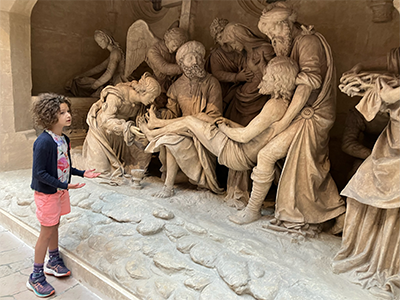
Lauren Mancia | Apr 11, 2024

Everything Has a History
Brett Topel | Mar 27, 2024
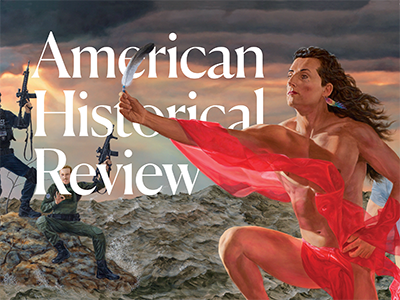
AHA Activities
Mark Philip Bradley | Mar 12, 2024

In Memoriam
Jane Kamensky | Mar 4, 2024
Most Recent

Austin McCoy | Jan 22, 2024

Thavolia Glymph | Jan 17, 2024

Douglas S. Chan and Palma J. You | Jan 2, 2024

Mark Philip Bradley | Dec 15, 2023

Edward Muir | Dec 4, 2023
Articles on Cultural history
Displaying 1 - 20 of 42 articles.

A short history of sunscreen, from basting like a chook to preventing skin cancer
Laura Dawes , Australian National University


Handkerchief or tissue? Which one’s better for our health and the planet?
Mark Patrick Taylor , Macquarie University and Hester Joyce , La Trobe University

Chemical adventurers: the science of the mind has a long, colourful history of psychedelic exploration
Nick Haslam , The University of Melbourne

Why craft beer fosters better communities than its corporate competitors
Tyson Mitman , York St John University

Elon Musk’s buyout of Twitter has placed its user-generated archives in danger
Ian Milligan , University of Waterloo

18th- and 19th-century Americans of all races, classes and genders looked to the ancient Mediterranean for inspiration
Sean P. Burrus , Bowdoin College

The unfulfilled American dream stalks Mike Davis’s dystopian Los Angeles in his masterful City of Quartz
Ian Tyrrell , UNSW Sydney

International film archives are streaming up a storm during lockdown. Australia’s movie trove isn’t even online
Victoria Duckett , Deakin University

Civilisations: BBC reboot of Kenneth Clark’s 1960s classic is more diverse – but is it less challenging?
Matthew Potter , Northumbria University, Newcastle

Exhibiting Arab modern art in Iran is about more than just diplomacy
Edward McDonald-Toone , UCL
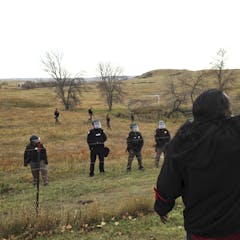
How the archaeological review behind the Dakota Access Pipeline went wrong
Chip Colwell , University of Colorado Denver

Meet 3-million - year-old Lucy – she’ll tell you a lot about modern African heritage
Duane Jethro , University of Cape Town

The ongoing taboo of menstruation in Australia
Carla Pascoe Leahy , The University of Melbourne

This woman’s work: the onscreen and offscreen war service of Claire Adams Mackinnon
Heather L. Robinson , Flinders University

Albert Pierrepoint: a ‘haunted hangman’ and the death penalty today
Lizzie Seal , University of Sussex

The Confederate battleflag comes in waves, with a history that is still unfurling
Juliette Peers , RMIT University

What’s in a word? The challenges of ‘transgender’
KJ Rawson , College of the Holy Cross

Do you see what I’m wearing? How clothes reveal who we are
Robyn Gibson , University of Sydney

Let’s unstick our postage stamps from Howard’s Australia
Dennis Altman , La Trobe University

Ancient cities are being bulldozed by Islamic State – here’s what the world is losing
Paul Collins , University of Oxford
Related Topics
- American culture
- Archaeology
- Art history
- Cultural heritage
- National Film and Sound Archive
- Social media
Top contributors
Emeritus Professor of Cultural Research, Institute for Culture and Society, Western Sydney University
Cultural Researcher, University of Notre Dame Australia
Visiting Scientist of Electrical and Computer Engineering, Cornell University
Director of the Centre for Organisational and Social Informatics, Monash University
Associate Professor in American Politics and Foreign Policy, US Studies Centre, University of Sydney
Lecturer, Centre for Advancing Journalism, The University of Melbourne
VC Fellow, La Trobe University
Adjunct Professor, University of Technology Sydney
Professor of English, Institute for Humanities and Social Sciences, ACU, Australian Catholic University
Digital Archivist
Research fellow, The University of Melbourne
Lecturer, Centre for Heritage and Museum Studies, Australian National University
Senior Lecturer, Literary and Gender Studies, Victoria University
Lecturer, Twentieth Century History, University of Liverpool
Associate Professor in Archaeology and Space Studies, Flinders University
- X (Twitter)
- Unfollow topic Follow topic

Exploring 250 Essay Topics in Biographies: From Autobiographies to Cultural and Ethnic Stories
Welcome to our comprehensive guide exploring 25 essay topics in various branches of historical inquiry. History is a multidimensional field of study that encompasses a wide range of disciplines, methodologies, and perspectives. In this article, we will delve into different branches of historical research, providing you with thought-provoking essay topics to ignite your curiosity and inspire your academic exploration.
Whether you are a history student, a researcher, or simply an enthusiast seeking to deepen your understanding of the past, these essay topics will offer you a starting point to explore and analyze significant themes and concepts within each field. From the examination of historical schools of thought to the exploration of diverse histories such as gender, culture, and postcolonialism, this collection of essay topics aims to engage with the complexity and richness of historical scholarship.
Historical Schools of Thought
Historical schools of thought refer to different theoretical frameworks and approaches used by historians to interpret and understand the past. These schools of thought offer distinct perspectives on how history should be studied, emphasizing different aspects such as political, social, economic, cultural, or intellectual factors. They provide a foundation for historical analysis and contribute to the ongoing debates and interpretations within the field of history.
Historical Schools of Thought Essay Topics
- The Enlightenment and its impact on modern political thought
- The Renaissance: A rebirth of art, science, and humanism
- The Industrial Revolution and its effects on social and economic thought
- The rise of Marxism and its influence on socialist movements
- The impact of Freudian psychoanalysis on psychology and the study of the mind
- The contributions of ancient Greek philosophers to Western philosophical thought
- The development of existentialism and its impact on philosophy and literature
- The role of the Scientific Revolution in challenging traditional religious beliefs
- The influence of the Bauhaus movement on modern architecture and design
- The feminist movement and its contribution to gender studies and social thought
- The development of the Civil Rights Movement and its impact on racial equality
- The emergence of the Romantic movement and its influence on art and literature
- The impact of the French Revolution on political ideologies and systems
- The rise of nationalism and its effects on the formation of modern nation-states
- The development of the human rights movement and its global impact
- The role of Confucianism in shaping East Asian social and ethical thought
- The Enlightenment and the birth of modern science and the scientific method
- The contributions of African-American intellectuals to the Civil Rights Movement
- The impact of Darwin's theory of evolution on religious and scientific thought
- The emergence of postmodernism and its critique of traditional knowledge systems
- The influence of the Harlem Renaissance on African-American art and literature
- The rise of colonialism and its effects on indigenous cultures and thought
- The philosophical underpinnings of the American Revolution and the founding of the United States
- The development of feminist literary criticism and its impact on literary studies
- The impact of the Enlightenment on educational systems and the spread of knowledge.
Comparative History
Comparative history involves the study and analysis of historical events, processes, or phenomena across different regions, societies, or time periods. By comparing similarities and differences, comparative historians aim to identify patterns, relationships, and causal factors that shape historical developments. This approach allows for a broader understanding of historical phenomena and offers insights into the diversity of human experiences and societies.
Comparative History Essay Topics
- A Comparative Study of Ancient Civilizations: Egypt, Mesopotamia, and Indus Valley
- Comparative Analysis of Ancient Greek and Roman Democracy
- Comparing the Byzantine and Islamic Empires: Religion, Politics, and Culture
- A Comparative Study of Feudalism in Europe and Japan
- The French Revolution and the American Revolution: A Comparative Analysis
- Comparative Examination of Colonialism in Africa and Asia
- The Industrial Revolution in Britain and Germany: A Comparative Perspective
- Comparative Study of the Bolshevik Revolution in Russia and the Chinese Communist Revolution
- Comparative Analysis of the Civil Rights Movements in the United States and South Africa
- A Comparative Study of the Women's Suffrage Movements in the United States and Britain
- Comparing the Renaissance in Italy and the Northern European Countries
- Comparative Study of Imperialism in the British and Ottoman Empires
- The Cold War: A Comparative Analysis of the United States and Soviet Union
- Comparative Analysis of the Mayan and Inca Civilizations in the Americas
- A Comparative Study of the Age of Exploration: European and Chinese Voyages
- Comparative Analysis of the Mughal Empire in India and the Ottoman Empire in the Middle East
- Comparative Study of the Protestant Reformation and the Counter-Reformation
- A Comparative Analysis of the Russian Revolution and the Iranian Revolution
- Comparative Study of Ancient Law Codes: Hammurabi's Code and the Twelve Tables
- Comparing the Reformation in England and Germany: Henry VIII and Martin Luther
- Comparative Analysis of the Mongol Empires: Genghis Khan and Kublai Khan
- A Comparative Study of the American Civil War and the Spanish Civil War
- Comparative Analysis of the Cultural Revolutions in China and Iran
- Comparative Study of the Indian National Congress and African National Congress
- A Comparative Analysis of the American Great Depression and the Global Financial Crisis of 2008
Oral History
Oral history is a research method that involves gathering and analyzing firsthand accounts and personal narratives of individuals who have lived through particular historical events or periods. It emphasizes the importance of capturing and preserving the voices of those often excluded from written records, providing valuable insights into their experiences, perspectives, and memories. Oral history enhances our understanding of the lived realities of individuals and communities, offering a more nuanced and inclusive historical narrative.
Oral History Essay Topics
- The Importance of Oral History: Preserving Personal and Collective Narratives
- Oral History as a Tool for Indigenous Perspectives and Decolonization
- Ethics and Challenges in Conducting Oral History Interviews
- Oral History and Memory: Examining the Reliability and Subjectivity of Oral Accounts
- Oral History and Social Change: Amplifying Marginalized Voices
- Oral History and Family Narratives: Exploring Intergenerational Transmission of Memory
- Gender and Oral History: Uncovering Women's Experiences and Perspectives
- Oral History and War: Examining the Impact of Conflicts through Personal Testimonies
- Oral History and Migration: Capturing Stories of Displacement and Identity
- Oral History and Oral Traditions: Analyzing Cultural Continuity and Change
- Oral History and Community Engagement: Empowering Local Narratives
- Oral History and Labor Movements: Documenting Worker Experiences and Activism
- Oral History and LGBTQ+ Narratives: Archiving Queer Lives and Histories
- Oral History and Holocaust Studies: Bearing Witness to Survivors' Testimonies
- Indigenous Oral Histories: Resilience, Cultural Identity, and Land Rights
- Oral History and Environmental History: Narratives of Ecological Change
- Oral History and Urban History: Capturing Urban Transformations and Neighborhood Stories
- Oral History and Civil Rights Movements: Amplifying Voices of Activism and Resistance
- Oral History and Aging: Exploring Life Stories and Perspectives on Aging
- Oral History and Disability Studies: Challenging Stereotypes and Promoting Inclusion
- Oral History and Medicine: Exploring Patient Narratives and Healthcare Experiences
- Oral History and Genocide Studies: Preserving Stories of Survival and Loss
- Oral History and Indigenous Language Revitalization: Connecting Language and Culture
- Oral History and Folklore: Uncovering Legends, Myths, and Traditional Knowledge
- Oral History and the Digital Age: Opportunities and Challenges in Archiving and Sharing Stories
Archival Research
Archival research involves the investigation and analysis of primary source materials that are preserved in archives, such as documents, letters, diaries, photographs, maps, and other records. Historians rely on archival research to access and interpret original sources that provide direct evidence of past events and activities. It enables researchers to delve into specific historical contexts, uncover hidden or neglected histories, and construct detailed and accurate narratives based on authentic documentation.
Archival Research Essay Topics
- The Importance of Archival Research in Historical Scholarship
- Exploring the Role of Archival Research in Uncovering Hidden or Neglected Histories
- The Challenges and Opportunities of Conducting Archival Research
- Comparative Analysis of Traditional and Digital Archival Research Methods
- Archival Research and the Preservation of Cultural Heritage
- The Ethics of Access and Use in Archival Research
- Archival Research and the Reconstruction of Historical Narratives
- Archival Research and the Study of Material Culture
- Archival Research in Genealogy and Family History
- Archival Research and the Study of Linguistics and Dialects
- Archival Research and the Documentation of Oral Histories
- Archival Research and the Reconstruction of Historical Landscapes
- Archival Research and the Study of Economic History and Business Records
- Archival Research and the Study of Political History and Government Documents
- Archival Research and the Examination of Social Movements and Activism
- Archival Research and the Study of Gender and Sexuality History
- Archival Research and the Exploration of Colonialism and Post-Colonial Studies
- Archival Research and the Study of Diplomatic Relations and International Affairs
- Archival Research and the Examination of Literary and Artistic Works
- Archival Research and the Study of Science and Technology History
- Archival Research and the Analysis of Environmental History
- Archival Research and the Study of Medical History and Health Records
- Archival Research and the Exploration of Religious and Spiritual Traditions
- Archival Research and the Study of Education History and School Records
- Archival Research and the Investigation of Legal History and Court Records
Quantitative History
Quantitative history employs quantitative methods and statistical analysis to study historical phenomena. It involves the collection and analysis of numerical data, such as demographic records, economic indicators, voting patterns, or crime statistics. By quantifying historical data, historians can identify patterns, trends, and correlations, enabling them to make empirical claims about historical events and processes. Quantitative history complements qualitative approaches and provides a more systematic and quantitative understanding of the past.
Quantitative History Essay Topics
- The Rise of Quantitative History: Methodological Approaches and Contributions
- Quantitative History and Demographic Analysis: Exploring Population Dynamics
- Quantitative Analysis of Economic History: Patterns, Trends, and Growth
- Quantitative Approaches to Social Inequality and Class Structure
- Quantitative History and the Study of Migration and Mobility
- Statistical Analysis of Political History: Voting Patterns and Electoral Behavior
- Quantitative Methods in Studying War and Conflict: Casualties, Strategies, and Outcomes
- Quantitative Approaches to the Study of Disease and Public Health
- Quantitative Analysis of Urbanization and Urban Development
- Quantitative History and the Study of Colonialism and Imperialism
- Quantitative Methods in Exploring Environmental History and Climate Change
- Quantitative Analysis of Technological Change and Innovation
- Quantitative Approaches to the Study of Education and Literacy
- Quantitative History and the Analysis of Cultural and Intellectual Trends
- Quantitative Methods in Studying Long-Term Trends and Historical Cycles
- Quantitative Approaches to the Study of Gender and Women's History
- Quantitative Analysis of Social Networks and Community Dynamics
- Quantitative History and the Exploration of Religious and Spiritual Practices
- Quantitative Methods in Studying Legal History and Crime Patterns
- Quantitative Approaches to the Study of Material Culture and Consumer Behavior
- Quantitative Analysis of Diplomatic Relations and International Relations
- Quantitative History and the Examination of Media and Communication
- Quantitative Methods in Exploring Family and Household Structures
- Quantitative Approaches to the Study of Intellectual Property and Copyright
- Quantitative History and the Analysis of Historical Memory and Commemoration.
Postcolonial History
Postcolonial history examines the legacies, impacts, and consequences of colonialism and imperialism on societies and cultures. It explores the experiences of colonized peoples, their struggles for independence, and the processes of decolonization. Postcolonial historians challenge Eurocentric perspectives, centering marginalized voices, and engaging with issues of power, identity, resistance, cultural hybridity, and the ongoing effects of colonial domination.
Postcolonial History Essay Topics
- Postcolonial History: Defining the Field and Key Concepts
- Decolonization and the Birth of Postcolonial Nations
- The Impact of Colonialism on Indigenous Peoples: Continuities and Disruptions
- Postcolonial Identities: Hybridity, Resistance, and Cultural Expression
- Postcolonial Feminism: Intersectionality and Gender in the Global South
- Nationalism and Anti-Colonial Movements: Case Studies from Africa, Asia, and the Americas
- Economic Legacies of Colonialism: Dependency, Exploitation, and Unequal Development
- Language and Literature in Postcolonial Contexts: Rewriting History and Reclaiming Narratives
- Postcolonialism and Environmental Justice: Ecological Consequences of Colonial Exploitation
- Postcolonial Approaches to Education: Decolonizing Curricula and Pedagogies
- Postcolonial Cities: Urban Space, Power, and Marginalization
- Postcolonial Memory and Commemoration: Remembering and Reckoning with the Colonial Past
- Postcolonialism and Global Health: Colonial Medicine, Biopower, and Health Inequalities
- Postcolonial Legal Systems: Legal Pluralism, Human Rights, and Indigenous Justice
- Postcolonial Borders: Migration, Citizenship, and Identity
- Postcolonial Resistance and Social Movements: Solidarity, Anti-Imperialism, and Liberation
- Postcolonial Media and Popular Culture: Representation, Subversion, and Stereotypes
- Postcolonial Urbanism: Infrastructure, Displacement, and Gentrification
- Postcolonial Tourism: Authenticity, Exoticism, and Power Dynamics
- Postcolonial Intellectuals: Theorizing and Critiquing the Legacy of Empire
- Postcolonial Trauma and Healing: Addressing Historical Wounds and Collective Memory
- Postcolonial Science and Technology: Knowledge Production, Appropriation, and Resistance
- Postcolonial Ecocriticism: Nature, Land, and Environmental Justice
- Postcolonialism and Global Capitalism: Neocolonialism, Dependency, and Resistance
- Postcolonial Perspectives on International Relations: Global South, Diplomacy, and Power Dynamics
Gender History
Gender history explores the ways in which gender has shaped societies, institutions, and individuals throughout history. It examines how gender roles, identities, and power dynamics have influenced social, political, economic, and cultural developments. Gender historians explore issues such as gendered labor, family dynamics, sexuality, masculinity, femininity, and the intersections of gender with other social categories such as race, class, and ethnicity.
Gender History Essay Topics
- Gender History: Exploring the Intersections of Gender, Power, and Identity
- Gendered Perspectives on Historical Methodologies and Approaches
- Gender and the Construction of Sexuality: Challenging Norms and Categories
- Gendered Experiences of Colonialism: Agency, Resistance, and Subjugation
- Gender and the Evolution of Feminism: Waves, Debates, and Transnational Movements
- Gendered Labor and Work: From the Home to the Factory and Beyond
- Masculinity Studies and the Reconstruction of Male Identity
- Gender, Religion, and Spirituality: Roles, Rituals, and Challenges to Patriarchy
- Gender and the Politics of Reproduction: Birth Control, Abortion, and Family Planning
- Gendered Violence and the Struggle for Justice: Historical Perspectives
- Gender and Education: Access, Exclusion, and the Strive for Equality
- Gender and Health: Medicalization, Reproductive Health, and Sexuality
- Transgender History: Narratives of Identity, Activism, and Resistance
- Gender and Resistance Movements: Women's Suffrage, Civil Rights, and LGBTQ+ Activism
- Gender and War: Women's Roles, Military Masculinity, and Post-Conflict Reconstruction
- Gender and Popular Culture: Representations, Stereotypes, and Subversion
- Gender and the Body: Beauty Standards, Body Politics, and Embodiment
- Gendered Spaces: Public/Private Divide, Urbanization, and Domesticity
- Intersectionality and Gender: Race, Class, and Sexuality in Historical Context
- Gender and Technology: Women's Contributions, Technological Shifts, and Digital Divide
- Gender and Resistance to Colonial Rule: Indigenous Perspectives and Movements
- Gendered Perspectives on Immigration and Diaspora: Identity, Assimilation, and Transnationalism
- Gender and Intellectual History: Contributions, Exclusions, and Challenges
- Gender and Sport: Athletics, Competitions, and Breaking Gender Barriers
- Gender and the Law: Legal Rights, Discrimination, and Activism for Equality
Social History
Social history focuses on the everyday lives, experiences, and social structures of ordinary people. It examines aspects such as social classes, labor relations, family dynamics, social institutions, and cultural practices. Social historians aim to understand the lived experiences of individuals and groups within specific historical contexts, shedding light on social relationships, power dynamics, and societal changes over time.
Social History Essay Topics
- Social History: Tracing the Lives and Experiences of Everyday People
- Social Class and Inequality: Exploring Social Stratification in Historical Context
- Family and Kinship: Changing Dynamics and Structures in Social History
- Urbanization and Social Change: Impact on Communities and Everyday Life
- Social Movements and Activism: Grassroots Organizing for Change
- Gender and Sexuality in Social History: Norms, Expectations, and Subversion
- Race and Ethnicity in Social History: Identity, Discrimination, and Intersectionality
- Religion and Society: Influence, Conflict, and Rituals in Social History
- Work and Labor: From Agrarian to Industrial to Post-Industrial Eras
- Education and Intellectual Culture: Access, Systems, and Ideals in Social History
- Health and Medicine in Social History: Public Health, Disease, and Well-being
- Social Networks and Communities: Bonds, Networks, and Social Capital
- Consumption and Consumer Culture: Materialism, Advertising, and Social Change
- Leisure and Recreation: Entertainment, Sports, and Social Identity
- Migration and Mobility: Impacts on Society and Cultural Exchange
- The Family in Social History: Changing Roles, Structures, and Dynamics
- Youth Culture: Rebellion, Identity Formation, and Countercultures
- Crime and Deviance: Social Control, Law Enforcement, and Punishment
- Social Welfare and Assistance: Evolution of Support Systems and Safety Nets
- Social History of Technology: Impact on Daily Life, Communication, and Industry
- Social History and Environmental Perspectives: Human Interactions with Nature
- Social History of Childhood: Child Labor, Education, and Changing Concepts
- Social History of Aging: Elder Care, Retirement, and Intergenerational Relationships
- Housing and the Built Environment: Architecture, Neighborhoods, and Social Cohesion
- Social History of Food and Eating: Dietary Habits, Class, and Cultural Significance
Cultural History
Cultural history investigates the beliefs, values, practices, and cultural expressions of past societies. It examines art, literature, music, rituals, symbols, and popular culture to understand how cultural ideas and practices shape and are shaped by historical contexts. Cultural historians explore the ways in which cultural dynamics intersect with social, political, economic, and intellectual dimensions, contributing to a deeper understanding of human experiences and identities.
Cultural History Essay Topics
- Cultural History: Interpreting and Analyzing the Meaning of Cultural Expressions
- Cultural Encounters and Cross-Cultural Exchanges: Exploring Cultural Interactions and Influences
- Cultural Identity and Nationalism: Constructing and Negotiating Collective Belonging
- Cultural Icons and Symbols: Analyzing the Significance and Evolution of Cultural Representations
- Popular Culture and Everyday Life: Examining Cultural Practices and Consumption Patterns
- Material Culture and Cultural Artifacts: Uncovering the Meanings and Histories of Objects
- Cultural Memory and Commemoration: Remembering and Preserving Collective Histories
- Cultural Movements and Countercultures: Subversion, Resistance, and Social Change
- Cultural Appropriation and Cultural Heritage: Debates and Ethical Considerations
- Cultural Landscapes and Urban Spaces: Tracing the Impact of Culture on Built Environments
- Cultural Performance and Ritual: Exploring the Role of Rituals and Performances in Society
- Cultural Revivals and Cultural Preservation: The Politics of Heritage and Identity
- Gender and Cultural History: Analyzing the Role of Gender in Cultural Practices and Representations
- Ethnicity and Cultural Expression: Examining the Interplay between Culture and Ethnic Identity
- Cultural History of Language and Linguistic Practices: Communication and Cultural Identity
- Cultural Responses to War and Conflict: Art, Literature, and Popular Culture
- Cultural History of Food and Cuisine: Culinary Traditions, Identity, and Globalization
- Cultural Perspectives on Religion and Spirituality: Beliefs, Practices, and Symbolism
- Cultural History of Music and Dance: Sound, Movement, and Cultural Expression
- Cultural Representations in Visual Arts: Paintings, Sculptures, and Photography
- Cultural History of Technology: Technological Innovations and Cultural Transformations
- Cultural History of Fashion: Clothing, Style, and Cultural Significance
- Cultural History of Literature: Analyzing Literary Works as Reflections of Culture and Society
- Cultural Responses to Globalization: Hybridity, Localization, and Transnationalism
- Cultural History of Sports: Sports as Social and Cultural Phenomena
Revisionist History
Revisionist history refers to the reexamination and reinterpretation of historical events, narratives, and perspectives. It involves challenging established interpretations and seeking alternative viewpoints to provide a more nuanced and accurate understanding of the past. Revisionist historians critically analyze traditional accounts of history, question prevailing assumptions, and incorporate new evidence or perspectives that may have been marginalized or overlooked. By revisiting and reevaluating historical narratives, revisionist history contributes to ongoing debates, expands our knowledge, and offers fresh insights into the complexities of the past. It encourages a more comprehensive and inclusive understanding of history by addressing biases, filling gaps in existing knowledge, and shedding light on previously marginalized voices and perspectives.
Revisionist History Essay Topics
- The Concept of Revisionist History: Exploring Its Definition and Purpose
- Revisionist History and the Reinterpretation of Historical Events
- The Role of Revisionist History in Challenging Dominant Narratives
- Revisionist Approaches to Political History: Reassessing Leaders, Movements, and Ideologies
- Revisionist Perspectives on Social History: Reevaluating Power Structures and Marginalized Groups
- Revisionist History and the Reassessment of Historical Figures: Heroes, Villains, and Complicated Legacies
- Revisionist Approaches to Cultural History: Rethinking Art, Literature, and Popular Culture
- Revisionist History and the Reinterpretation of Historical Documents and Sources
- Revisionist Perspectives on Colonial History: Decentering European Narratives
- Revisionist History and the Examination of Gender and Sexuality: Challenging Traditional Assumptions
- Revisionist Approaches to Military History: Rethinking Strategies, Tactics, and Consequences
- Revisionist History and the Reassessment of Economic Systems and Inequalities
- Revisionist Perspectives on Diplomatic History: Rethinking Alliances, Treaties, and Conflicts
- Revisionist History and the Study of Science and Technology: Examining Alternative Narratives
- Revisionist Approaches to Environmental History: Rethinking Human-Environment Interactions
- Revisionist History and the Reevaluation of Indigenous Perspectives and Histories
- Revisionist Perspectives on Medical History: Challenging Biomedical Assumptions and Practices
- Revisionist History and the Examination of Intellectual Movements and Ideas
- Revisionist Approaches to Legal History: Rethinking Laws, Justice, and Rights
- Revisionist History and the Reassessment of Historical Periodizations and Boundaries
- Revisionist Perspectives on Migration and Diaspora: Rethinking Identity, Belonging, and Borders
- Revisionist History and the Examination of Religion and Spirituality: Challenging Established Beliefs
- Revisionist Approaches to Educational History: Rethinking Pedagogies and Knowledge Transmission
- Revisionist History and the Reassessment of Historical Trauma and Memory
- Revisionist Perspectives on Global History: Rethinking Eurocentrism and Multiple Modernities
As we conclude our journey through these 25 essay topics across various branches of historical inquiry, we hope that they have sparked your interest and provided you with a glimpse into the diverse and fascinating realms of historical research. Each field offers its unique perspective, methodologies, and critical questions, inviting scholars and students alike to delve deeper into the complexities of the past.
By exploring historical schools of thought, comparative history, oral history, archival research, quantitative history, postcolonial history, gender history, social history, cultural history, and revisionist history, we have encountered a myriad of lenses through which we can view and interpret the past. These essay topics encourage us to challenge conventional narratives, explore untold stories, and engage with the diverse experiences of individuals, communities, and societies across time.
The study of history is an ever-evolving endeavor, as new evidence, methodologies, and perspectives continually shape our understanding of the past. We encourage you to seize the opportunity to engage with these essay topics, conduct further research, and embark on your own intellectual exploration of the vast tapestry of human history. Through critical analysis, empathy, and an open mind, we can contribute to the ongoing conversations that shape our collective understanding of the past and its significance for the present and future.

- Organisations & projects
- Bibliography
- Facts & figures
- Image gallery
- Lecture series
Cultural history
Cultural history is not simply the study of high culture or alternatively of peoples' past rituals. It is best characterised as an approach which considers the domain of representation and the struggle over meaning as the most fruitful areas for the pursuit of historical understanding. In its modern form it evolved to a certain extent out of the 'new' social, economic and women's histories of the 1960s and 1970s, which sought to understand the lives of non-elites and women, but whose use of structures of class was increasingly seen as reductionist, ignoring the assumptions and judgements actually shaping, say, women's experiences. As this approach grew in popularity from the 1980s onwards it became associated with the 'linguistic turn', as its interest in contested meanings inevitably means an interest in the language these are expressed in. Today cultural history practices are increasing applied to a wide variety of subjects, generating histories of the body or of food, for example.
Click here to read full article
Related publications
- Peter Burke, What is Cultural History? (Cambridge, 2004) Clifford Geertz, The Interpretation of Cultures: Selected Essays (New York, 1973) E. H. Gombrich, In Search of Cultural History (Oxford, 1969)
Back to the top

The Institute of Historical Research © 2008
A List of 185 Interesting Cultural Topics to Write About
Culture is a set of knowledge, behaviors, and beliefs shared by a group of people. You would probably agree that it’s an integral part of humanity. It’s no wonder that students are often assigned to write about it.
Our specialists will write a custom essay specially for you!
That’s why we came up with a list of interesting and creative culture essay topics. Whether you are writing a research paper, an essay, or a speech, our list of culture topics is for you. You can find various topics from popular culture and funny aspects of culture to cultural diversity. They will be useful for middle school, high school, and college students.
Sometimes it takes teamwork to receive a good grade. Let custom-writing.org help you ace any written assignment!
- 🔝 Top 10 Topics
- 🏺 Western Culture Topics
- 📚✍️ Cultural Criticism
- 🎥 Cultural Phenomena
- 🧔👓 Subculture Topics
- 🧑🤝🧑 Socio-Cultural Topics
- ⛩️🕌 Cultural Diversity
- 👥 Cultural Anthropology
🔝 Top 10 Cultural Topics
- What causes culture shock?
- Cultural appropriation in fashion
- The Cold War’s impact on culture
- Women’s role in Italian culture
- Global impact of American culture
- How to preserve cultural diversity
- Pros and cons of cultural globalization
- Cultural differences in East Asian countries
- How do people assimilate into a foreign culture?
- Cultural background’s effect on one’s personality
🏺 Western Culture Topics to Write About
Much of today’s culture takes roots in the Western world. With this subject, the possibilities are endless! You can write about ancient civilizations or modern European culture. Sounds interesting? Then have a look at these topics:
- Write about a Greek myth of your choice.
- Research the history of the ancient Roman theater.
- Pick a Greek philosopher and describe their legacy.
- The heritage of the Roman Empire in the modern world.
- Discover the history of the Olympic Games .
- How did Christianity spread throughout Europe?
- The architecture of ancient Britain.

- How did the Great Plague influence western culture?
- Write about the key Renaissance artists .
- How did humanism emerge in British culture?
- Pick a European country and analyze how its traditions developed.
- The impact of the Renaissance on Europe’s worldview.
- Research the latest archeological discoveries of western civilization .
- How did the Protestant Reformation influence German culture?
- The legacy of the Renaissance artworks.
- What was the effect of the 1848 revolution on art?
- The role of scientific discoveries in Europe’s socio-cultural formation.
- Analyze the influence of colonization of African culture.
- Describe the highlights of the Enlightenment period .
- How did Brexit affect the British lifestyle?
- Did the American Revolution bring change in culture?
- What attitude does Poland have about their World War II heritage?
- How did the technological revolution impact everyday life in Europe?
- The influence of World War I on French culture.
- Write about European fashion during a specific period.
📚✍️ Cultural Criticism Essay Topics
Cultural criticism looks at texts, music, and artworks through the lens of culture. This type of analysis suggests that culture gives an artwork a specific meaning. The following topics will guide you towards an excellent critical essay:
- Analyze the cultural aspects of your favorite novel.
- Ethnicity in Between the World and Me by Ta-Nehisi Coates .
- What’s the meaning of financial stability in The Great Gatsby ?
- Discover social changes in Margaret Mitchell’s Gone with the Wind .
- The effect of industrialization in John Steinbeck’s The Grapes of Wrath .
- The Adventures of Huckleberry Finn and its context.
- Representation of race in Invisible Man by Ralph Ellison .
- Note the cultural features of The Hundred-Foot Journey by Richard C. Morais.
- Write about the main character’s mindset in The Kite Runner by Khaled Hosseini .
- What are the main character’s values in A Bronx Tale ?
- Hispanic customs in The Tortilla Curtain by T. C. Boyle.
- Discover cultural clashes in Fury by Salman Rushdie.
- Pick a movie and analyze the cultural impact on your perception of the plot.
- Discuss the beliefs of white women in The Help .
- Does the movie My Big Fat Greek Wedding portray Greek-American culture correctly?
- How did the background story in Slumdog Millionaire change your perception of the main character?
- What’s the meaning of gender in Bend It Like Beckham ?
- Far and Away : integration into a new society.
- Pick a painting and analyze its cultural background.

- Compare depictions of Christ from different continents.
- Discover the context of Delacroix’s Liberty Leading the People .
- What’s the context of Punjabi Ladies Near a Village Well ?
- Discuss the symbolism of Girl with a Pearl Earring .
- Write about social roles based on Homer among the Greeks by Gustav Jäger.
- Select a song and analyze how culture is reflected in the lyrics.
🎥 Cultural Phenomena Topics for an Essay
Cultural phenomena refer to developing certain beliefs or preferences among many people. It is also called the bandwagon effect . Keep in mind that the fact of something becoming popular is not a phenomenon. This notion is more concerned with the process of gaining fame than with fame itself. Take a look at these helpful topic ideas for your paper:
Just in 1 hour! We will write you a plagiarism-free paper in hardly more than 1 hour
- Describe any cultural phenomenon in your area.
- Reasons why TikTok gained popularity in the U.S.
- How did the Pokemon Go! fad spread across the world?
- Analyze the percentage of people worldwide who like McDonald’s .
- What factors made “the dab” popular?
- Can the bandwagon effect explain bullying ?
- Discover cross-cultural fashion trends.
- Does social media facilitate cultural phenomena?
- Pick a celebrity and analyze their fanbase.
- How can you explain the high demand for Apple products?
- What made sitcoms popular?
- Write about Thanksgiving celebrations outside the U.S.
- Reasons why famous authors from the past remain influential.
- Does effective marketing cause the bandwagon effect?
- Discuss the tendency to follow trends for social acceptance.
- Choose a classic movie and analyze its popularity.
- Examine similar TV talent shows across nations.
- Discover why some dishes are considered “America’s favorite.”
- Explore the psychological side of cultural phenomena.
- List criteria needed for becoming a famous musician.
- Analyze the bandwagon effect in history.
- Why was holocaust normalized in some nations?
- Explain why Nike products are popular all over the world.
- Did the bandwagon effect play a part in the Renaissance?
- Can the spread of religious beliefs be called a cultural phenomenon?
🧔👓 Subculture Topics for an Essay
The term “subculture” means “a culture within a culture.” In other words, it’s a smaller group, inside a larger one, with its own beliefs and interests. You can write about a specific subculture or discover why such groups form. Feel free to use these essay topics:
- Write about the athletic community.
- Are marketing strategies aimed at subcultures effective?
- Why is the deviation from social norms considered dangerous?
- What makes the Amish stand out?
- Can a subculture serve as a basis for a culture?
- Does the U.S. benefit from cybersport?

- Tell about a social group that you’re a part of.
- Clothes as an identifier of a subculture.
- Pick a religious organization and describe it.
- Why did the anime community grow worldwide?
- Explain why some subcultures are considered dangerous.
- How do social groups emerge?
- Should parents encourage children to join an interest group ?
- Describe the way people develop mutual beliefs cross-culturally.
- How does social media influence one’s lifestyle?
- Which interest group does your family belong to?
- Do subcultures benefit society?
- Analyze the Social Disorganization Theory concerning subcultures.
- How did hipsters influence global fashion trends?
- What are the requirements for becoming a skater?
- Discover the history and lifestyle of Goths .
- What is the basis of scumbro culture?
- Belonging to an interest group as a healthy social practice.
- What are the most popular subcultures amongst generation Z ?
- Discuss the importance of the hairstyle for subcultures.
🧑🤝🧑 Socio-Cultural Essay Topics
Let’s break the word “socio-cultural” in two parts. Social aspects include people, their roles, and available resources. Cultural factors refer to language, laws, religion, and values. Therefore, socio-cultural issues revolve around the unique design of a specific culture. Here are some topic ideas on this subject that you might find helpful.
- Describe the social stigma attached to single mothers .
- What pushes the elderly to the edge of poverty?
- Do marketing strategies vary from country to country?
- Is receiving psychological assistance culturally accepted in developing countries?
- Can art be misunderstood because of the socio-cultural context?
- Compare the average wage in the U.S. and the country of your choice.
- Does the increased use of technology in schools affect society?
- What factors push Americans to abuse drugs ?
- Which socio-cultural aspects make drunkenness acceptable?
- Describe the social environment in a country that legalizes slavery .
- Why do Christians get persecuted in some countries?
- How does information overload impact modern teenagers?
- Is child abuse justified outside the U.S.?
- Does technology affect the emotional maturity of children?
- Free education in Europe: pros and cons.
- Prove that the U.S. healthcare system should help the homeless.
- How often does cyberbullying occur worldwide?
- What does successful life mean for a third world country citizen?
- Does globalization put the national identity in danger?
- The importance of developing cultural sensitivity .
- Write about various religions in America .

- Discuss the correlation between the economic level and crime rates .
- Manifestations of ethical egoism in modern society.
- Cross-cultural missionary work: pros and cons.
- Does social stigma towards HIV contribute to its spread?
⛩️🕌 Cultural Diversity Topics for an Essay
America is one of the most diverse nations in the world. Each culture has its language, customs, and other factors that enrich a country like the U.S. The life of a culturally diverse community has its advantages and challenges. In your paper, unpack one of the aspects of such an environment. Take a look at these essay topics:
- Discuss ethnic groups within the U.S. which have the highest suicide rate .
- Is it essential for American psychologists to develop cultural competence ?
- Describe the basic principles of cultural respect.
- Prove that racism should not be tolerated.
- Does the American education system embrace ethnic minorities?
- Analyze the benefit of ethnic inclusiveness for the U.S. food industry .
- How can managers encourage a multiethnic environment in the workplace?
- White about the challenges of second-generation Americans.
- Should the term “ immigrant ” be banned?
- Discuss the advantages of the U.S. as a multicultural nation.
- Prove that the English language proficiency test shouldn’t be required for U.S. citizenship.
- What is the effect of prejudice against ethnic minorities?
- How does diversity find a place in American traditions ?
- Describe the culture shock experience of an international student.
- Is transracial adoption becoming more common in the U.S.?
- What is cultural narcissism, and how can you avoid it?
- Effective strategies for conflict resolution in a diverse environment .
- What multiculturalism policies currently exist in the U.S.?
- Analyze the heritage of a specific nation.
- Should learning a second language be mandatory in America?
- What are the stereotypes associated with different ethnicities?
- Describe the benefits of ethnic diversity.
- Write about the widespread interracial marriages in the U.S.
- How can one avoid cultural ignorance?
- Are the Americans guilty of ethnocentrism ?
👥 Cultural Anthropology Topics for a Paper
Cultural anthropology is a study of beliefs, practices, and social organization of a group. The shaping of ideas and the physical environment are in the focus of this study. In other words, anthropology discovers why people live the way they do. This list will help narrow down your attention on this subject.

- Why are social networks commonly used in the U.S.?
- Explain the popularity of online shopping worldwide.
- Will e-books replace paper books in developed countries?
- Artificial intelligence technologies in Japan.
- Pick two American states and compare their laws.
- Why is cycling so prevalent in the Netherlands?
- How architecture reflects a nation’s history.
- Why is it easier to receive citizenship in some countries than in others?
- Explain why Americans have a strong sense of national pride.
- Analyze the perception of time in tropical countries.
- Are most Swiss households wealthy?
- Discover how language reflects a cultural worldview.
- Does the country’s economy affect the self-esteem of its citizens?
- Reasons for the political division in the U.S.
- Analyze the difference in lifestyles between the Northern and the Southern states .
- Why is it common in some countries to be bilingual ?
- Analyze the cultural values of a communistic nation.
- How can liberalism affect the education system?
- What’s the social meaning of disease in third world countries?
- Examine how the two-child policy affects the Chinese lifestyle.
- Free health care: pros and cons.
- Write about the way the former Soviet Union countries transitioned from communism.
- Do Christian traditions vary from culture to culture?
- Analyze the impact of refugee presence in European countries.
- Does traditional food reflect the history of a nation?
We hope you were able to pick a culture topic for your paper after reading this article.
Receive a plagiarism-free paper tailored to your instructions. Cut 20% off your first order!
Good luck with your assignment on culture!
Further reading:
- 497 Interesting History Topics to Research
- 137 Social Studies Topics for Your Research Project
- 512 Research Topics on HumSS (Humanities & Social Sciences)
- How to Write an Art Critique: Examples and Simple Techniques
- 430 Philosophy Topics & Questions for Your Essay
- 267 Hottest Fashion Topics to Write About in 2024
🔍 References
- So You’re an American?: State.gov
- A Brief History of Western Culture: Khan Academy
- What Exactly is “Western Culture”?: University of California, Santa Barbara
- What is Cultural Criticism?: University of Saskatchewan
- What is a Subculture?: Grinnell College
- Socio-Cultural Factors and International Competitiveness: ResearchGate
- Cultural Diversity: Definition & Meaning: Purdue Global
- What Is Cultural Anthropology?: US National Park Service
- Cultural Anthropology: Encyclopedia Britannica
- Share to Facebook
- Share to Twitter
- Share to LinkedIn
- Share to email

The Earth is a complex system. To understand it, geologists examine the lithosphere and its layers. They trace our planet’s history by using physical and chemical methods. At the same time, geographers observe environmental patterns. They also focus on the interaction between humans and nature. Keep reading to find out...

Mathematics is the science of numbers and shapes. Writing about it can give you a fresh perspective and help to clarify difficult concepts. You can even use mathematical writing as a tool in problem-solving. In this article, you will find plenty of interesting math topics. Besides, you will learn about...

Cause and effect essays examine how an event happened and what consequences it had. Gaining weight after eating lots of fast food is an example of a cause-and-effect relationship. Possible topics cover a variety of subjects ranging from mental health to history and politics. This article gives you an outline...

An analysis essay aims to break down the subject in order to understand it. You can choose to analyze a text, a process, or an idea. This article will help you write a great essay! Selecting an interesting topic makes writing a lot easier. We’ve prepared a list of excellent...

Everybody knows that being healthy requires effort. We should exercise regularly and maintain a balanced diet. However, the reward is worth it. A healthy lifestyle prevents chronic illnesses and leads to better body performance. Besides, if you improve your physical well-being, your mental health will strengthen as well! In this...

Environment affects us all, whether we want it or not. Political leaders and students alike discuss ways to tackle environmental topics & issues. Some might argue about the role humans play in all this. The fact remains that our environment is a delicate matter. That’s why we must educate ourselves...

Our code of ethics is derived from what we think is right or wrong. On top of that, we have to agree to the moral standards established by the society we live in. Conventional norms generally label theft, murder, or harassment as bad. However, there are many influences that impact...

A definition explains the meaning of a term or a concept. In a dictionary, you’ll find a definition in a single sentence. A definition paper, however, encompasses several paragraphs. Such an essay, amongst other things, can include personal experience and examples. To write a successful definition paper, you need to...

As simple as it is, the purpose of the descriptive essay is to explain or portray its subject. It can focus on any topic or issue you want to write about. Be sure that any middle school, high school, or college student can manage this type of creative writing assignment!...

Rhetorical analysis essay focuses on assessing the method used for delivering a message. This assignment isn’t about giving an opinion on the topic. The purpose is to analyze how the author presents the argument and whether or not they succeeded. Keep reading to find out more strategies and prompts for...

A narrative essay tells a story about a series of events. At the core of this kind of essay can be a personal experience or a fictional plot. Any story can be a basis for a narrative essay! Narratives can look similar to descriptions. Still, they are different. A descriptive...

Similar to the instructions in a recipe book, process essays convey information in a step-by-step format. In this type of paper, you follow a structured chronological process. You can also call it a how-to essay. A closely related type is a process analysis essay. Here you have to carefully consider...

Search Google Appliance
- Online Book Collections
- Online Books by Topic
- Biodiversity Heritage Library
- Library Catalog (SIRIS)
- Image Gallery
- Art & Artist Files
- Caldwell Lighting
- Trade Literature
- All Digital Collections
- Current Exhibitions
- Online Exhibitions
- Past Exhibitions
- Index of Library & Archival Exhibitions on the Web
- Research Tools and OneSearch
- E-journals, E-books, and Databases
- Smithsonian Research Online (SRO)
- Borrowing and Access Privileges
- Smithsonian Libraries and Archives on PRISM (SI staff)
- E-news Sign Up
- Internships and Fellowships
- Work with Us
- About the Libraries
- Library Locations
- Departments
- History of the Libraries
- Advisory Board
- Annual Reports
- Adopt-a-Book
- Ways to Give
- Gifts-in-Kind
You are here
Databases for history and culture research.
- General History andCulture Resources
Historic Newspaper Resources
- Biography and Genealogy Resources
This list highlights some of the history and culture databases available to researchers from the Smithsonian Libraries and Archives. A complete listing of electronic resources is located on the Libraries and Archives' E-journals, E-books, and Databases . Databases that require SI network for access are indicated by "SI staff." For information about remote access see Off-Site Access to Electronic Resources .
General History and Culture Resources
- Archives Unbound (SI Staff): Presents topically-focused digital collections of historical documents that cover a broad range of topics from the Middle Ages to the 20th century.
- American Civil War: Letters and Diaries (SI Staff): Contains over 2,000 authors and approximately 100,000 pages of diaries, letters and memoirs, presenting viewpoints and first-hand accounts from people on both sides of the conflict.
- Gale Cengage Databases (SI Staff): Search across more than 30 Gale databases at the same time, including American and foreign newspapers (some historical, some current), as well as a variety of U.S. and international history sources.
- JSTOR (SI Staff): Full-text searchable articles from more than 500 scholarly journals in the arts and humanities, economics and politics, mathematics and other fields of study.
- North American Immigrant Letters, Diaries and Oral Histories (SI Staff): Includes over 2,100 authors and approximately 100,000 pages of information, providing a unique and personal view of what it meant to immigrate to America and Canada between 1800 and 1950.
- North American Women's Letters and Diaries (SI Staff): I ncludes the immediate experiences of 1,325 women and 150,000 pages of diaries and letters. The collection also includes biographies and an extensive annotated bibliography of the sources in the database.
- Project Muse (SI Staff): Provides full-text access to hundreds of high quality, peer-reviewed journals from non-profit scholarly publishers, including university presses and societies, covering a wide variety of disciplines.
- ProQuest (SI Staff): Search across all available ProQuest different databases at once or select specific ones to search, including American Periodicals, Ethnic NewsWatch, Women's Magazine Archive, and historical newspapers such as the Washington Post, New York Times , Los Angeles Times , and Chicago Defender .
- Smithsonian Collections Online (Gale Cengage) (SI Staff): Online archive of Smithsonian and Air & Space Magazine issues, as well as online access to selected trade catalogs and World's Fair materials from Smithsonian collections.
- African American Newspapers (1827-1998) (SI Staff) : Covers life in the Antebellum South through the Civil Rights movement and more.
- Chronicling America: Historic American Newspapers : This resource from the Library of Congress lets you search America's historic newspaper pages from 1789-1924 or use the U.S. Newspaper Directory to find information about American newspapers published between 1690-present.
- Ethnic NewsWatch (SI Staff) : Coverage: 1959-present. Included are journals, magazines, and newspapers from ethnic and minority presses. Ethnicities include: African American/Caribbean/African; Arab/Middle Eastern; Asian/Pacific Islander; European/Eastern European; Hispanic; Jewish; Native People.
- Google News Archive : A list of U.S. and foreign digitized newspapers, arranged alphabetically by title. Coverage varies widely.
- Harper's Weekly 1857-1912 (SI Staff) : America's leading 19th century illustrated newspaper.
- Atlanta Constitution (SI Staff) : Coverage: 1868- 1984
- Atlanta Daily World (SI Staff) : Coverage: 1931- 2010
- Baltimore Afro-American (SI Staff) : Coverage: 1893- 1988
- Boston Globe (SI Staff) : Coverage: 1872- 1989
- Chicago Defender (SI Staff) : Coverage: 1909- 2010
- Chicago Tribune (SI Staff) : Coverage: 1849- 1997
- Hartford Courant (SI Staff) : Coverage: 1764- 1995
- Los Angeles Times (SI Staff) : Coverage: 1881- 1996
- New York Amsterdam News (SI Staff) : Coverage: 1922- 1993
- New York Times (SI Staff) : Coverage: 1851- 2017
- New York Tribune (SI Staff) : Coverage: 1841- 1922
- Pittsburgh Courier (SI Staff) : Coverage: 1911- 2010
- St. Louis Post-Dispatch (SI Staff) : Coverage: 1874- 1922
- Washington Post (SI Staff) : Coverage: 1877-2004 (Smithsonian employees can register for a free current digital subscription at https://wapo.st/34iLbRs )
- Wikipedia List of Online Newspaper Archives : A listing of both free and pay wall blocked digital newspaper archives from the U.S. and foreign countries.
Biography and Genealogy Resources
- Ancestry Library Edition (SI Staff): Powered by Ancestry.com, this resource offers access to billions of records for genealogical research.
- American National Biography Online (SI Staff): Offers portraits of more than 19,000 men and women, from all eras and walks of life, whose lives have shaped the nation.
- Biography and Genealogy Master Index (SI Staff): Indexes current, easily accessible references sources to help find biographical material on people from all time periods, geographic locations, and fields of endeavor.
- FamilySearch : For over 100 years, FamilySearch has been actively gathering, preserving, and sharing genealogical records worldwide.
- Fold3 (SI Staff): Provides access to military records, including the stories, photos, and personal documents of the men and women who served. Also includes some census records and selected other non-military materials.
- Frontiers in Big Data
- Data Mining and Management
- Research Topics
Visualizing Big Culture and History Data
Total Downloads
Total Views and Downloads
About this Research Topic
The visual analysis and communication of cultural-historical data - whether of cultural collections, biographies, actor networks, or larger historical formations - has become an established and active field of research. Digitization efforts of archives, museums, libraries, heritage sites or other ...
Keywords : visualization, cultural data, cultural history, cultural collections, digital humanities, digital history
Important Note : All contributions to this Research Topic must be within the scope of the section and journal to which they are submitted, as defined in their mission statements. Frontiers reserves the right to guide an out-of-scope manuscript to a more suitable section or journal at any stage of peer review.
Topic Editors
Topic coordinators, recent articles, submission deadlines.
Submission closed.
Participating Journals
Total views.
- Demographics
No records found
total views article views downloads topic views
Top countries
Top referring sites, about frontiers research topics.
With their unique mixes of varied contributions from Original Research to Review Articles, Research Topics unify the most influential researchers, the latest key findings and historical advances in a hot research area! Find out more on how to host your own Frontiers Research Topic or contribute to one as an author.
Numbers, Facts and Trends Shaping Your World
Read our research on:
Full Topic List
Regions & Countries
- Publications
- Our Methods
- Short Reads
- Tools & Resources
Read Our Research On:
Diverse Cultures and Shared Experiences Shape Asian American Identities
About six-in-ten feel connected to other asians in the u.s., table of contents.
- The making of Asian American identity and knowledge of Asian history in the U.S.
- Immigrant ties shape Asian Americans' identities and their life in the U.S.
- Asians in the U.S. share similar views among themselves and with the U.S. public on what it means to be American
- How Asians in the U.S. describe their identity
- Asian adults and the general public agree: U.S. Asians have many different cultures
- Whom do U.S. Asians consider Asian?
- A majority of Asian adults say others would describe them as Asian when walking past them on the street
- For many Asian adults, where they were born shapes friendships formed in the U.S.
- Most Asian adults are comfortable with intermarriage
- Some Asians say they have hidden their heritage
- Connections with other Asian Americans, politics and political parties
- Need for a national leader advancing the concerns of Asian Americans
- Asian American registered voters and political party
- About one-quarter of Asian adults say they are informed about U.S. Asian history
- What being ‘truly American’ means to U.S. Asians
- Fewer than half of U.S. Asians consider themselves typical Americans
- What do Asian Americans view as important for the American dream?
- Most Asian adults say the American dream is within reach, but about a quarter say they will never achieve it
- Acknowledgments
- Sample design
- Data collection
- Weighting and variance estimation
- Largest origin groups
- Educational attainment
- Immigration status
- Length of time living in the U.S. among immigrants
- Citizenship status among immigrants
Pew Research Center conducted this analysis to understand the rich diversity of people of Asian origin or ancestry living in the United States and their views of identity. The study is part of the Center’s multiyear, comprehensive, in-depth quantitative and qualitative research effort focused on the nation’s Asian population. Its centerpiece is this nationally representative survey of 7,006 Asian adults exploring the experiences, attitudes and views of Asians living in the U.S. The survey sampled U.S. adults who self-identify as Asian, either alone or in combination with other races or Hispanic ethnicity. It was offered in six languages: Chinese (Simplified and Traditional), English, Hindi, Korean, Tagalog and Vietnamese. Responses were collected from July 5, 2022, to Jan. 27, 2023, by Westat on behalf of Pew Research Center.
The Center recruited a large sample to examine the diversity of the U.S. Asian population, with oversamples of the Chinese, Filipino, Indian, Korean and Vietnamese populations. These are the five largest origin groups among Asian Americans. The survey also includes a large enough sample of self-identified Japanese adults, making findings about them reportable. In this report, the six largest ethnic groups include those who identify with one Asian ethnicity only, either alone or in combination with a non-Asian race or ethnicity. Together, these six groups constitute 81% of all U.S. Asian adults, according to a Pew Research Center analysis of the Census Bureau’s 2021 American Community Survey (ACS), and are the six groups whose attitudes and opinions are highlighted throughout the report. Survey respondents were drawn from a national sample of residential mailing addresses, which included addresses from all 50 states and the District of Columbia. Specialized surnames list frames maintained by the Marketing Systems Group were used to supplement the sample. Those eligible to complete the survey were offered the opportunity to do so online or by mail with a paper questionnaire. For more details, see the Methodology . For questions used in this analysis, see the Topline Questionnaire .
The survey research plan and questionnaire were reviewed and approved by Westat’s institutional review board (IRB), which is an external and independent committee of experts specializing in protecting the rights of research participants.
Even though the U.S. Asian population was the fastest growing racial and ethnic group in the country from 2000 to 2019 , it is still a relatively small population. According to the 2021 American Community Survey, the country’s Asian population constitutes 7% of the U.S. population (of all ages) and 7% of adults (those ages 18 and older).
Pew Research Center designed this study with these details in mind to be as inclusive as possible of the diversity of Asian American experiences. Even so, survey research is limited when it comes to documenting the views and attitudes of the less populous Asian origin groups in the U.S. To address this, the survey was complemented by 66 pre-survey focus groups of Asian adults , conducted from Aug. 4 to Oct. 14, 2021, with 264 recruited participants from 18 Asian origin groups. Focus group discussions were conducted in 18 different languages and moderated by members of their origin groups.
Findings for less populous Asian origin groups in the U.S., those who are not among the six largest Asian origin groups, are grouped under the category “Other” in this report and are included in the overall Asian adult findings in the report. These ethnic origin groups each make up about 2% or less of the Asian population in the U.S., making it challenging to recruit nationally representative samples for each origin group. The group “Other” includes those who identify with one Asian ethnicity only, either alone or in combination with a non-Asian race or Hispanic ethnicity. Findings for those who identify with two or more Asian ethnicities are not presented by themselves in this report but are included in the overall Asian adult findings.
To learn more about how members of less populous Asian origin groups in the U.S. identify, see the quote sorter based on our focus group discussions. There, you can read how participants describe their identity in their own words.
For this analysis, an additional national survey of 5,132 U.S. adults was conducted from Dec. 5 to 11, 2022, using Pew Research Center’s American Trends Panel . The survey of U.S. adults was conducted in English and Spanish. Respondents are recruited through national, random sampling of residential addresses.
Pew Research Center has conducted multiple studies that focus on Asian Americans. Previous demographic studies examined the diversity of origins , key facts , and rising income inequality among Asians living in the U.S. and key findings about U.S. immigrants. Qualitative studies have focused on what it means to be Asian in America as well as barriers to English language learning among Asian immigrants. Previous surveys have focused on concerns over discrimination and violence against Asian Americans, as well as studies about their religious beliefs . Find these publications and more on the Center’s Asian Americans topic page .
Pew Research Center is a subsidiary of The Pew Charitable Trusts, its primary funder. The Center’s Asian American portfolio was funded by The Pew Charitable Trusts, with generous support from The Asian American Foundation; Chan Zuckerberg Initiative DAF, an advised fund of the Silicon Valley Community Foundation; the Robert Wood Johnson Foundation; the Henry Luce Foundation; the Doris Duke Foundation; The Wallace H. Coulter Foundation; The Dirk and Charlene Kabcenell Foundation; The Long Family Foundation; Lu-Hebert Fund; Gee Family Foundation; Joseph Cotchett; the Julian Abdey and Sabrina Moyle Charitable Fund; and Nanci Nishimura.
We would also like to thank the Leaders Forum for its thought leadership and valuable assistance in helping make this survey possible.
The strategic communications campaign used to promote the research was made possible with generous support from the Doris Duke Foundation.
The terms Asian, Asians living in the United States , U.S. Asian population and Asian Americans are used interchangeably throughout this report to refer to U.S. adults who self-identify as Asian, either alone or in combination with other races or Hispanic identity.
Ethnicity and ethnic origin labels, such as Chinese and Chinese origin, are used interchangeably in this report for findings for ethnic origin groups, such as Chinese, Filipino, Indian, Japanese, Korean or Vietnamese. For this report, ethnicity is not nationality. For example, Chinese in this report are those self-identifying as of Chinese ethnicity, rather than necessarily being a current or former citizen of the People’s Republic of China. Ethnic origin groups in this report include those who self-identify as one Asian ethnicity only, either alone or in combination with a non-Asian race or ethnicity.
Less populous Asian origin groups in this report are those who self-identify with ethnic origin groups that are not among the six largest Asian origin groups. The term includes those who identify with only one Asian ethnicity. These ethnic origin groups each represent about 2% or less of the overall Asian population in the U.S. For example, those who identify as Burmese, Hmong or Pakistani are included in this category. These groups are unreportable on their own due to small sample sizes, but collectively they are reportable under this category.
The terms Asian origins and Asian origin groups are used interchangeably throughout this report to describe ethnic origin groups.
Immigrants in this report are people who were not U.S. citizens at birth – in other words, those born outside the U.S., Puerto Rico or other U.S. territories to parents who are not U.S. citizens. I mmigrant , first generation and foreign born are used interchangeably to refer to this group.
Naturalized citizens are immigrants who are lawful permanent residents who have fulfilled the length of stay and other requirements to become U.S. citizens and who have taken the oath of citizenship.
U.S. born refers to people born in the 50 U.S. states or the District of Columbia, Puerto Rico or other U.S. territories.
Second generation refers to people born in the 50 states or the District of Columbia, Puerto Rico or other U.S. territories with at least one first-generation (immigrant) parent.
Third or higher generation refers to people born in the 50 states or the District of Columbia, Puerto Rico or other U.S. territories with both parents born in the 50 states, D.C., Puerto Rico or other U.S. territories.
The nation’s Asian population is fast growing and diverse. Numbering more than 23 million, the population has ancestral roots across the vast, ethnically and culturally rich Asian continent. For Asians living in the United States, this diversity is reflected in how they describe their own identity. According to a new, nationwide, comprehensive survey of Asian adults living in the U.S., 52% say they most often use ethnic labels that reflect their heritage and family roots, either alone or together with “American,” to describe themselves. Chinese or Chinese American, Filipino or Filipino American, and Indian or Indian American are examples of these variations.
There are other ways in which Asians living in the U.S. describe their identity. About half (51%) of Asian adults say they use American on its own (10%), together with their ethnicity (25%) or together with “Asian” as Asian American (16%) when describing their identity, highlighting their links to the U.S.
And while pan-ethnic labels such as Asian and Asian American are commonly used to describe this diverse population broadly, the new survey shows that when describing themselves, just 28% use the label Asian (12%) on its own or the label Asian American (16%).
The survey also finds that other labels are used by Asian Americans. Some 6% say they most often prefer regional terms such as South Asian and Southeast Asian when describing themselves.
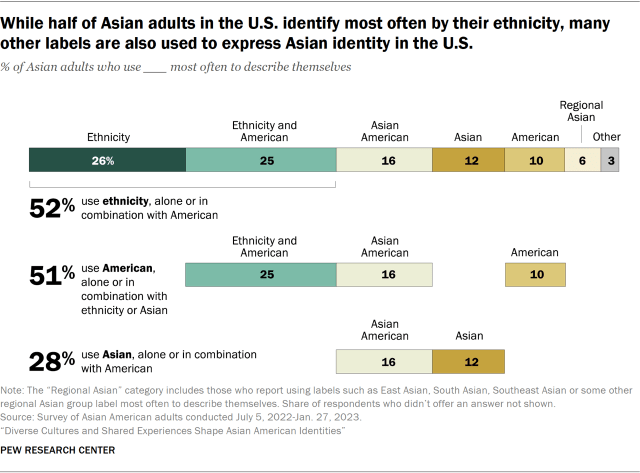
Asian adults see more cultural differences than commonalities across their group as well. When asked to choose between two statements – that Asians in the U.S. share a common culture, or that Asians in the U.S. have many different cultures – nearly all (90%) say U.S. Asians have many different cultures. Just 9% say Asians living in the U.S. share a common culture. This view is widely held across many demographic groups among Asian Americans, according to the survey.
The view that Asian Americans have many different cultures is also one held by the general public, according to another Pew Research Center survey of U.S. adults, conducted in December 2022. Among all U.S. adults, 80% say Asians in the U.S. have many different cultures, while 18% say they share a common culture. 1
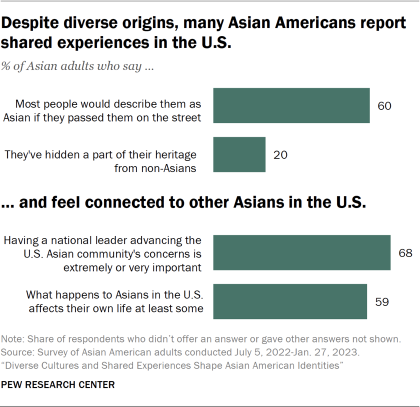
Though Asian Americans’ identities reflect their diverse cultures and origins, Asian adults also report certain shared experiences. A majority (60%) say most people would describe them as “Asian” while walking past them on the street, indicating most Asian adults feel they are seen by others as a single group, despite the population’s diversity. One-in-five say they have hidden a part of their heritage (their ethnic food, cultural practices, ethnic clothing or religious practices) from others who are not Asian, in some cases out of fear of embarrassment or discrimination. Notably, Asian adults ages 18 to 29 are more likely to say they have done this than Asians 65 and older (39% vs. 5%).
Asian adults in the U.S. also feel connected with other Asian Americans. About six-in-ten (59%) say that what happens to Asians in the U.S. affects their own lives, at least to some extent. 2 And about two-thirds (68%) of Asian Americans say it is extremely or very important to have a national leader advocating for the concerns and needs of the Asian population in the U.S.
The new survey also shows that large majorities of Asian adults share similar views on what it takes to be considered truly American. And they consider many of the same factors to be important in their views of the American dream.
These are among the key findings from Pew Research Center’s new survey of Asian American adults, conducted by mail and online from July 5, 2022, to Jan. 27, 2023. This is the largest nationally representative survey of its kind to date that focused on Asian Americans. The survey was conducted in English and five Asian languages, among a representative sample of 7,006 Asian adults living in the United States.
Asian Americans are 7% of the U.S. population, according to a Pew Research Center analysis of the 2021 American Community Survey. Their population is diverse, with roots in more than 20 countries in East Asia, Southeast Asia and the Indian subcontinent. About 54% of the national Asian population are immigrants. The six largest origin groups (Chinese, Filipino, Indian, Japanese, Korean and Vietnamese), a focus of this survey and report, together account for 79% of all Asian Americans.
Overall, about 34% of Asian Americans are the U.S.-born children of immigrant parents, and another 14% are of third or higher generation (meaning their parents were born in the U.S. as well), according to a Pew Research Center analysis of the 2022 Current Population Survey, March Annual Social and Economic Supplement.
This survey and report focus on Asian adults in the U.S. The six largest origin groups together account for 81% of Asian adults. And 68% of Asian American adults are immigrants, according to Center analysis of the 2021 American Community Survey. Additionally, 25% are the U.S.-born children of immigrant parents and 10% are of third or higher generation, according to Center analysis of government data.
The pan-ethnic term “Asian American” emerged in Berkeley, California, in the 1960s as part of a political movement to organize the diverse U.S. Asian population. The creation of an Asian American identity was in reaction to a long history of exclusion of Asians in the country, including the 1882 Chinese Exclusion Act and a pair of Supreme Court cases in the 1920s clarifying that Asians, including South Asians, are not “free White persons” and therefore were excluded from becoming naturalized U.S. citizens. 3 Subsequently, the term was adopted by the federal government and today is the principal identity label used by media, academics, researchers and others to describe today’s diverse Asian American population.
In most cases today, someone is considered Asian or Asian American if they self-identify as such. But Asian Americans do not necessarily agree on which regional or ethnic groups from the Asian continent they consider to be Asian, according to the new survey. The vast majority of Asian adults say they consider those from East Asia, such as Chinese or Koreans (89%); Southeast Asia, such as Vietnamese or Filipinos (88%); and to a lesser extent South Asia such as Indians or Pakistanis (67%) to be Asian.
But Asian adults are split on whether they consider Central Asians such as Afghans or Kazakhs to be Asian (43% of Asian adults say they are). While about half of Indian adults (56%) say they would include Central Asians in the category Asian, fewer than half of Filipino (40%), Chinese (39%), Japanese (34%), Korean (32%) and Vietnamese (30%) adults consider them Asian.
Few Asians say they are knowledgeable about U.S. Asian history
Asian Americans have a long history in the United States. From Chinese laborers who helped build the first transcontinental railroad, to Japanese immigrants who arrived as plantation workers in what is now the state of Hawaii, to the incarceration of Japanese Americans during World War II, to Filipinos being treated as U.S. nationals while the Philippines was a U.S. territory, the Asian American experience has been a part of U.S. history.
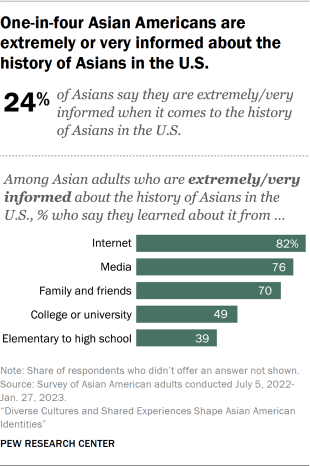
With the passage of the landmark Immigration and Nationality Act of 1965, a new wave of immigrants from Asia began arriving in the United States, creating a new, contemporary U.S. Asian history. The Vietnam War and other conflicts in Southeast Asia brought Vietnamese and other Southeast Asian refugees to the U.S. , first with the passage of the 1975 Indochina Migration and Refugee Assistance Act and then with the Refugee Act of 1980. The 1990 Immigration Act raised immigration ceilings and set in place processes that allowed the flows of Asian immigrants, particularly of high-skilled immigrants, to continue and expand. The U.S. technology boom of the 1990s and 2000s attracted many high-skilled immigrants, particularly from India and China, to tech centers around the country.
This rich history, however, is little-known to Asian adults, according to the new survey. One-in-four (24%) say they are very or extremely informed about history of Asians in the United States, while an equal share (24%) say they are little or not at all informed.
The majority of those very or extremely informed about the history of Asians in the U.S. say they learned about this history through informal channels: internet (82%), media (76%) and family and friends (70%). In contrast, 49% learned about it from college or university courses and 39% from elementary through high school.
Immigrant ties shape Asian Americans’ identities and their life in the U.S.
Immigration experiences, connections with home countries, and how long someone has lived in the U.S. shape many Asian Americans’ identities. Among Asian adults in the U.S., immigrants are more likely than those who are U.S. born to describe their identity most often with their ethnic labels, either alone or together with the label American (56% vs. 41%).
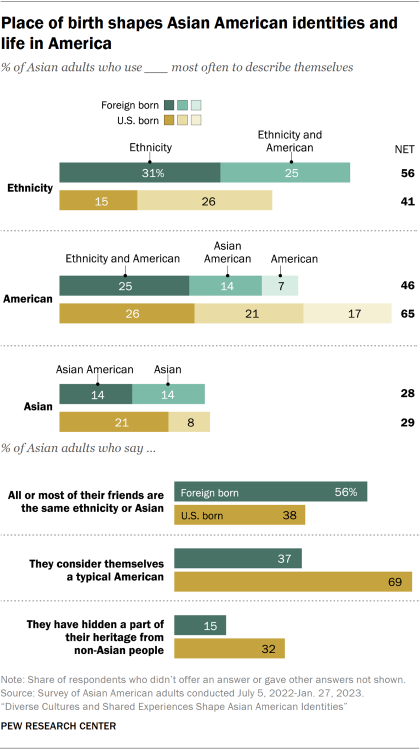
Meanwhile, Asian immigrants are less likely than U.S.-born Asians (46% vs. 65%) to say they most often describe themselves as American in some way – whether by their ethnic label combined with American, as Asian American, or simply as American. Still, nearly half of Asian immigrants describe themselves in one of these three ways.
When it comes to identifying with the label Asian – either alone or as Asian American – immigrant and U.S.-born Asians are about equally likely to say they do so (28% and 29% respectively). Immigrant Asians are less likely than U.S.-born Asians to identify most often as Asian American (14% vs. 21%).
On the question of seeing themselves more as a “typical American” or “very different from a typical American,” Asian immigrant adults are far less likely than those born in the U.S. to think of themselves as a typical American (37% vs. 69%).
Nativity is also tied to how Asians in the U.S. develop their friendships. Those who immigrated to the U.S. are more likely to have friends who are Asian or of the same ethnicity as them than are U.S.-born Asians (56% vs. 38%).
Asian immigrants (15%) are also less likely than U.S.-born Asians (32%) to have ever hidden a part of their heritage from people who are not Asian. When asked in an open-ended question to explain why they hide aspects of their culture, some U.S.-born respondents mentioned phrases such as “fear of discrimination,” “being teased” and “embarrassing.”
Views of identity among Asian American immigrants are often tied to time spent in the U.S.
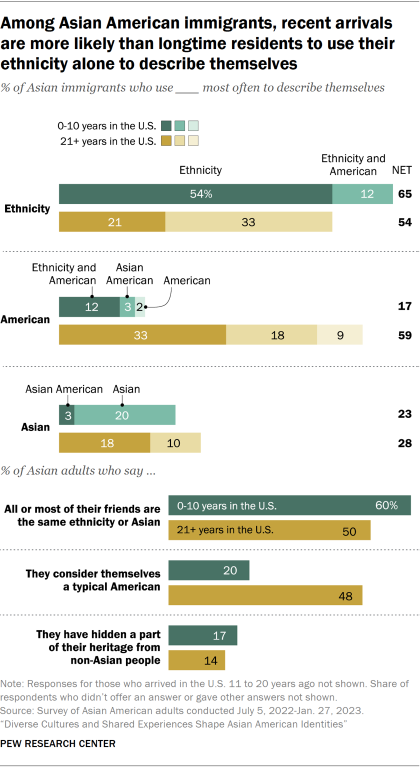
How long Asian immigrants have lived in the U.S. also shapes their identity and experiences. Those who arrived in the U.S. in the past 10 years are more likely than those who arrived more than 20 years ago to say they most often use their ethnicity, such as Filipino or Vietnamese, to describe themselves. And about two-thirds (65%) of those who arrived in the U.S. in the past decade describe their identity most often with their ethnicity’s name, either alone or combined with American, compared with 54% among those who have been in the country for more than two decades.
Roughly half (54%) of those who have arrived in the past 10 years say they most often use only their ethnicity to describe themselves, compared with just 21% of those who arrived more than two decades ago who say the same.
On the other hand, just 17% of Asian immigrants who arrived in the country in the past 10 years describe themselves most often as American, by their ethnic label combined with American, or as Asian American, while 59% of those who arrived more than 20 years ago do so.
When it comes to their circle of friends, 60% of Asian immigrants who arrived in the past 10 years say most or all of their friends are also Asian Americans, while 50% of those who arrived more than 20 years ago say the same.
And when asked if they think of themselves as typical Americans or not, Asian immigrants who arrived in the U.S. in the past decade are substantially less likely than those who arrived more than two decades ago to say they are typical Americans (20% vs. 48%).
The new survey also explored the views Asian Americans have about traits that make one “truly American.” Overall, Asian Americans and the general U.S. population share similar views of what it means to be American. Nearly all Asian adults and U.S. adults say that accepting people of diverse racial and religious backgrounds (94% and 91%), believing in individual freedoms (92% and 94%) and respecting U.S. political institutions and laws (89% and 87%) are important for being truly American.
Similarly, Asian Americans and the U.S. general population share in their views about the American dream. They say having freedom of choice in how to live one’s life (96% and 97% respectively), having a good family life (96% and 94%), retiring comfortably (96% and 94%) and owning a home (both 86%) are important to their view of the American dream. Smaller shares of Asian and U.S. adults (30% and 27%) say owning a business is important to their view of the American dream.
Here are other survey findings highlighting the diverse views and attitudes of Asian adults living in the U.S.:
- Indian adults are the most likely of the six largest Asian origin groups to say they most often use their ethnicity, without the addition of “American,” to describe themselves. About four-in-ten Indian adults (41%) say they do this. By comparison, smaller shares of Korean (30%), Filipino (29%), Chinese (26%) and Vietnamese (23%) adults do the same. Japanese adults (14%) are the least likely among the largest groups to use their ethnic identity term alone.
- Japanese adults are the least likely among the largest Asian origin groups to say they have friendships with other Asians. About one-in-three Japanese adults (34%) say most or all their friends share their own ethnicity or are otherwise Asian. By contrast, about half of all Indian (55%), Vietnamese (55%), Chinese (51%), Korean (50%) and Filipino (48%) respondents say the same.
- One-in-four Korean adults (25%) say they have hidden part of their heritage from people who are not Asian. Some 20% of Indian, 19% of Chinese, 18% of Vietnamese, 16% of Filipino and 14% of Japanese adults say they have done the same.
- Across the largest ethnic groups, about half or more say that what happens to Asians in the U.S. affects what happens in their own lives. About two-thirds of Korean (67%) and Chinese (65%) adults say this. By comparison, 61% of Japanese, 54% of Filipino, 55% of Indian and 52% of Vietnamese adults say they are impacted by what happens to Asians nationally.
- Most Asian adults among the largest ethnic origin groups say a national leader advancing the U.S. Asian community’s concerns is important. Roughly three-in-four Filipino (74%) and Chinese (73%) adults say it is very or extremely important to for the U.S. Asian community to have a national leader advancing its concerns. A majority of Vietnamese (69%), Korean (66%), Japanese (63%) and Indian adults (62%) says the same.
- About half of Vietnamese registered voters (51%) identify with or lean to the Republican Party. In contrast, about two-thirds of Indian (68%), Filipino (68%) and Korean (67%) registered voters identify with or lean toward the Democratic Party. And 56% of Chinese registered voters also associate with the Democratic Party.
- This finding is from a nationally representative survey of 5,132 U.S. adults conducted by Pew Research Center from Dec. 5 to 11, 2022, using the Center’s American Trends Panel . ↩
- In recent years, a major source of concern and fear among many Asian adults in the U.S. has been the rise in reported violence against Asian Americans . ↩
- For more on the history of the creation of an Asian American identity, see Lee, Jennifer and Karthick Ramakrishnan. 2019. “ Who counts as Asian .” Ethnic and Racial Studies. ↩
Sign up for The Briefing
Weekly updates on the world of news & information
- Asian Americans
- Immigrant Populations
- Integration & Identity
- Racial & Ethnic Identity
- Racial Bias & Discrimination
Key facts about Asian Americans living in poverty
Methodology: 2023 focus groups of asian americans, 1 in 10: redefining the asian american dream (short film), the hardships and dreams of asian americans living in poverty, key facts about asian american eligible voters in 2024, most popular, report materials.
1615 L St. NW, Suite 800 Washington, DC 20036 USA (+1) 202-419-4300 | Main (+1) 202-857-8562 | Fax (+1) 202-419-4372 | Media Inquiries
Research Topics
- Age & Generations
- Coronavirus (COVID-19)
- Economy & Work
- Family & Relationships
- Gender & LGBTQ
- Immigration & Migration
- International Affairs
- Internet & Technology
- Methodological Research
- News Habits & Media
- Non-U.S. Governments
- Other Topics
- Politics & Policy
- Race & Ethnicity
- Email Newsletters
ABOUT PEW RESEARCH CENTER Pew Research Center is a nonpartisan fact tank that informs the public about the issues, attitudes and trends shaping the world. It conducts public opinion polling, demographic research, media content analysis and other empirical social science research. Pew Research Center does not take policy positions. It is a subsidiary of The Pew Charitable Trusts .
Copyright 2024 Pew Research Center
Terms & Conditions
Privacy Policy
Cookie Settings
Reprints, Permissions & Use Policy
- SUGGESTED TOPICS
- The Magazine
- Newsletters
- Managing Yourself
- Managing Teams
- Work-life Balance
- The Big Idea
- Data & Visuals
- Reading Lists
- Case Selections
- HBR Learning
- Topic Feeds
- Account Settings
- Email Preferences
The Research-Backed Benefits of Daily Rituals
- Michael I. Norton

A survey of more than 130 HBR readers asked how they use rituals to start their days, psych themselves up for stressful challenges, and transition when the workday is done.
While some may cringe at forced corporate rituals, research shows that personal and team rituals can actually benefit the way we work. The authors’ expertise on the topic over the past decade, plus a survey of nearly 140 HBR readers, explores the ways rituals can set us up for success before work, get us psyched up for important presentations, foster a strong team culture, and help us wind down at the end of the day.
“Give me a W ! Give me an A ! Give me an L ! Give me a squiggly! Give me an M ! Give me an A ! Give me an R ! Give me a T !”
- Michael I. Norton is the Harold M. Brierley Professor of Business Administration at the Harvard Business School. He is the author of The Ritual Effect and co-author of Happy Money: The Science of Happier Spending . His research focuses on happiness, well-being, rituals, and inequality. See his faculty page here .
Partner Center

- E-mail the Help Desk
- User's Guide for H-Announce
Where is the Sex in Sex Work History? Accessing sexual practices through histories of sex work and prostitution
In the past decades, the history of commercial sex has become a burgeoning field of research. While early scholarship confined “prostitution” to the fields of social history and women’s history, the past decade has witnessed a broadening of perspectives and methodological approaches – from cultural history to global history and histories of labor, gender, the body, and sexualities. Despite the development of the field and the evident centrality of sex to sex work, it is precisely these sex practices that have received the least analytical attention in historical research. This stems in part from the methodological difficulties involved in accessing past sexual practices and experiences in historical sources. It might also be due to the “respectability” politics that historians engage in when trying to research sex work while avoiding the “prostitution stigma” attached to the topic and to the subjects who performed it. By focusing on governmental perspectives, social and economic factors, and media and social constructions of “prostitution”, historians could attempt to avoid the sex of sex work. Nevertheless, as trends in the fields of the history of sexuality and queer histories have shown, concrete sexual practices are situated in specific times and social environments.
Histories of sexuality have increasingly moved away from a focus on discourse and policing and towards a study of sexual practices and experiences. We propose using the sources and methodologies used by historians of sex work/prostitution to give us an insight into the sexual practices and the subjectivities of historical actors more generally. In doing so, we can also fight back against the stigma surrounding this topic, and against “respectability” politics, by openly and analytically discussing the still-taboo topic of sex practices in the history of sex work and prostitution. The goal of this workshop is to bring the sex of sex work into the centre of historical analysis and to thus truly integrate histories of sex work into histories of sexuality. We also hope to bring the history of sex work closer to queer history, where commercial sex so far had a problematic status since the sex of sex work was and is not associated with the leisure or sexual identity of the sex worker. We plan to explore the methodological, theoretical, and ethical dimensions of researching the histories of sexual practice and sexuality through sex work and prostitution history.
We welcome submissions that address one or more of the following questions (as well as all submissions that engage with the histories of sexual practice and sexuality in the field of sex work/prostitution from a variety of perspectives and methodologies):
- How do we access sexual practices in historical sources? - Many sources used in sex work history are regulatory and transmit governmental and institutional perspectives, such as police reports, court records, and medical examinations. How can we best use these sources while still acknowledging their limits and biases? - What methodologies can be made fruitful for the history of sex work and prostitution, especially when examining body and sex practices? - How can we meaningfully frame, analyze, compare, and differentiate sexual practices and sexual identities in our work? - How do historical actors themselves distinguish between sex for pleasure, sex for work, and other types of sex? How do they discuss sexual practices in general, and what topics do they engage in or avoid? - What can this research add to the history of sexuality, gender history, and queer/trans-histories? - What are the ethical concerns in this approach, and how can we approach our subjects’ voices and experiences while (as historians and researchers) avoiding voyeurism and over-sexualization of the historical actors?
Submissions from all disciplines are welcome (and we hope to have a fruitful interdisciplinary exchange), as long as they have a historical perspective. We especially welcome submissions from MA students, PhD students, and early career researchers. Please send an abstract of 250 words and a short bio to [email protected] by the 5th of July, 2024. Please indicate whether you can get funding from your institution or require financial assistance to attend the workshop, as we have a limited budget.
10.10-11.10.2024, Freie Universität Berlin - Free University Berlin (Germany)
Organised by Working Group: Sex work history (Adrina Schulz (Zurich), Alisha Edwards (Bochum), Annalisa Martin (Greifswald), Nora Lehner (Vienna/FU Berlin), Priska Komaromi (HU Berlin), Sonja Dolinsek (Magdeburg)
Working Group: Sex work history (Adrina Schulz (Zurich), Alisha Edwards (Bochum), Annalisa Martin (Greifswald), Nora Lehner (Vienna/ FU Berlin), Priska Komaromi (HU Berlin), Sonja Dolinsek (Magdeburg)
Interesting American History Research Paper Topics

In this page, we present a comprehensive guide to finding and selecting interesting American history research paper topics . Whether you are a history student or an academic researcher, this resource aims to provide you with a wealth of options and insights to uncover the captivating stories and significant events that have shaped the American experience. With a focus on engaging and thought-provoking subject matter, our list of interesting American history research paper topics covers a wide range of categories and subtopics. By delving into these captivating areas, you can delve into the rich tapestry of American history and develop a research paper that offers fresh perspectives and compelling narratives.
100 Interesting American History Research Paper Topics
Exploring the fascinating realms of American history offers students and researchers a multitude of opportunities to delve into captivating topics. In this section, we present a comprehensive list of interesting American history research paper topics, carefully organized into 10 categories. From political milestones to social movements, cultural shifts, and economic transformations, these topics provide a broad spectrum of ideas for conducting in-depth research and analysis. Let’s dive into the rich tapestry of interesting American history research paper topics and discover the intriguing topics that await exploration.
Academic Writing, Editing, Proofreading, And Problem Solving Services
Get 10% off with 24start discount code, colonial america.
- The impact of the Mayflower Compact on the development of self-governance in early America
- The Salem Witch Trials: Causes, consequences, and the cultural context of witchcraft accusations
- The role of religious freedom in the establishment of the thirteen colonies
- Slavery in Colonial America: Origins, expansion, and resistance
- The influence of the Great Awakening on the religious landscape of Colonial America
- The founding of Jamestown: Challenges, triumphs, and the establishment of the first permanent English settlement
- The interaction between Native American tribes and European colonizers in early America
- The impact of the French and Indian War on the relationship between the American colonies and the British Empire
- The evolution of the Puritan society in New England: Ideals, conflicts, and legacy
- The Boston Tea Party: Causes, significance, and its role in igniting the American Revolution
Revolutionary Era and the Founding of the Nation
- The ideological roots of the American Revolution: Enlightenment philosophy and its influence on the Founding Fathers
- The role of women in the American Revolution: Activism, contributions, and challenges
- The drafting and impact of the Declaration of Independence: Ideas, influences, and its enduring legacy
- The Constitutional Convention: Debates, compromises, and the creation of the U.S. Constitution
- Alexander Hamilton and the economic policies that shaped early America
- The Federalist vs. Anti-Federalist debates: Perspectives on government and the formation of political parties
- The impact of the American Revolution on slavery and the abolitionist movement
- The Battle of Yorktown: Turning point of the Revolutionary War and its consequences
- The emergence of political cartoons during the Revolutionary Era and their role in shaping public opinion
- The Whiskey Rebellion: Causes, consequences, and its significance in early American history
Westward Expansion and Manifest Destiny
- The Lewis and Clark Expedition: Goals, challenges, and their impact on westward expansion
- The Louisiana Purchase: Motivations, negotiations, and the consequences for American expansion
- The Oregon Trail: Challenges, hardships, and the experiences of pioneers
- The Mexican-American War: Causes, outcomes, and its impact on territorial expansion
- The Gold Rush of 1849: Socioeconomic effects and its influence on westward migration
- Native American displacement and resistance during westward expansion
- The completion of the Transcontinental Railroad: Technological advancements, economic implications, and cultural transformations
- The Homestead Act of 1862: Promises, challenges, and its effects on settlement in the West
- The Battle of Little Bighorn: Perspectives, myths, and the clash of cultures
- The closing of the American frontier: Consequences and the legacy of westward expansion
Civil War and Reconstruction
- The causes and consequences of the Civil War: Political, economic, and social factors
- The Emancipation Proclamation: Impact, limitations, and its significance for African Americans
- The role of women during the Civil War: Nurses, spies, and activists
- Abraham Lincoln: Leadership, speeches, and the legacy of his presidency
- Reconstruction policies: Successes, failures, and their long-term effects on the nation
- The impact of the 13th, 14th, and 15th Amendments on the rights of African Americans
- The Freedmen’s Bureau: Mission, challenges, and its efforts to assist newly emancipated slaves
- The Ku Klux Klan: Origins, activities, and its influence on racial tensions during Reconstruction
- The assassination of Abraham Lincoln: Conspiracies, aftermath, and its impact on national healing
- The Compromise of 1877: Resolving the disputed presidential election and its implications for Reconstruction
Progressive Era and the Gilded Age
- The rise of industrialization in America: Technological advancements, urbanization, and social transformations
- The Progressive Movement: Goals, reforms, and its impact on American society and politics
- The Triangle Shirtwaist Factory fire: Tragedy, labor activism, and the fight for workplace safety regulations
- The Populist Party: Origins, demands, and its influence on political discourse
- The role of women in the suffrage movement: Leaders, strategies, and the fight for voting rights
- Theodore Roosevelt and the conservation movement: Policies, national parks, and environmental advocacy
- The Haymarket Affair: Labor unrest, anarchist influences, and the impact on labor movements
- The Spanish-American War: Motivations, outcomes, and its impact on American imperialism
- The Great Railroad Strike of 1877: Causes, consequences, and its significance in labor history
- The Panama Canal: Construction, geopolitical implications, and its role in international trade
World War I and the Roaring Twenties
- America’s entry into World War I: Motivations, consequences, and the impact on American society
- The Treaty of Versailles: Negotiations, implications, and the U.S. decision not to ratify
- The Harlem Renaissance: Cultural movements, artistic achievements, and the African American experience
- Prohibition and the rise of organized crime: Causes, enforcement, and social consequences
- The Scopes Trial: Evolution vs. creationism, the clash of science and religion, and its legal ramifications
- The Red Scare: Anti-communist hysteria, political repression, and its effects on civil liberties
- The Jazz Age: Music, fashion, and the changing social dynamics of the 1920s
- Women’s suffrage and the 19th Amendment: Struggles, victories, and the changing role of women in society
- The Great Migration: Causes, experiences, and the impact of African Americans moving from the South to urban centers
- The Wall Street Crash of 1929: Causes, consequences, and its role in the onset of the Great Depression
The Great Depression and New Deal Era
- The causes and impact of the Great Depression on American society and the global economy
- The Dust Bowl: Environmental disaster, migration, and government responses
- The New Deal: Programs, policies, and their effectiveness in addressing the economic crisis
- The role of Eleanor Roosevelt: Activism, advocacy, and her influence on social reform
- The Bonus Army: Protests, the military response, and its impact on public opinion
- The Federal Writers’ Project: Literary contributions, folklore collection, and the preservation of American culture
- The art of the Great Depression: Visual expressions of hardship, resilience, and social commentary
- The Wagner Act: Labor rights, unionization, and its impact on workers’ rights
- The Social Security Act: Origins, provisions, and its legacy in social welfare programs
- The Dust Bowl migration and its influence on the demographic and cultural landscape of the West Coast
World War II and Post-War America
- America’s entry into World War II: Pearl Harbor, the home front, and the war effort
- The Manhattan Project: Development of the atomic bomb, ethical implications, and its role in ending the war
- Japanese internment during World War II: Causes, consequences, and the violation of civil liberties
- The GI Bill: Educational opportunities, housing benefits, and its impact on returning veterans
- The Marshall Plan: Reconstruction of Europe, containment policy, and America’s role in post-war recovery
- The Cold War: Origins, conflicts, and the impact on American society and foreign policy
- The Civil Rights Movement: Leaders, strategies, and the fight for racial equality
- McCarthyism and the Red Scare: Communist witch hunts, political repression, and the Hollywood blacklist
- The Korean War: Causes, outcomes, and its impact on the balance of power in Asia
- The Baby Boom: Population growth, suburbanization, and the changing dynamics of American family life
Civil Rights Movement and Social Change
- Brown v. Board of Education: Segregation, desegregation, and the landmark Supreme Court decision
- The Montgomery Bus Boycott: Rosa Parks, Martin Luther King Jr., and the power of nonviolent resistance
- The March on Washington: Martin Luther King Jr.’s “I Have a Dream” speech and its impact on civil rights legislation
- The Black Panther Party: Activism, community organizing, and the struggle for racial justice
- The Feminist Movement: Women’s liberation, reproductive rights, and the fight for gender equality
- The Stonewall Riots: LGBTQ+ activism, the birth of the gay rights movement, and the fight for equal rights
- The Indian Civil Rights Act of 1968: Native American sovereignty, activism, and the pursuit of self-determination
- The Chicano Movement: Immigration, labor rights, and the fight for social and political equality
- The Counterculture of the 1960s: Anti-war protests, hippie culture, and the quest for social change
- The Environmental Movement: Rachel Carson, Earth Day, and the fight for environmental awareness and conservation
Modern America and Contemporary Issues
- The Watergate Scandal: Political corruption, investigative journalism, and its impact on American politics
- The Reagan Era: Conservative politics, economic policies, and the redefinition of American conservatism
- The 9/11 Attacks: Causes, consequences, and the impact on national security and foreign policy
- The rise of social media: Transformations in communication, privacy concerns, and the influence on society
- The Black Lives Matter movement: Racial justice, police brutality, and the fight against systemic racism
- The #MeToo movement: Sexual harassment, gender equality, and the call for social change
- The opioid crisis: Causes, consequences, and the efforts to address the epidemic
- The presidency of Barack Obama: Historical significance, policies, and the impact on American society
- Immigration policy in the 21st century: Debates, challenges, and the changing demographics of America
- Climate change and environmental activism: The scientific consensus, policy debates, and the quest for sustainable solutions
This comprehensive list of interesting American history research paper topics provides a wide array of options for students and researchers to explore the captivating stories and pivotal moments in American history. From the early colonial period to modern-day issues, these topics offer abundant opportunities for in-depth research, critical analysis, and engaging writing. By selecting a topic aligned with personal interests and academic goals, students can embark on a rewarding journey of discovery and contribute to the rich tapestry of American historical scholarship.
American History: Exploring the Range of Interesting Research Paper Topics
American history is a captivating and diverse subject that encompasses a vast array of fascinating topics. From the early colonization of the continent to the modern era, the history of the United States is filled with remarkable events, influential figures, and transformative social movements. In this article, we will explore the breadth and depth of interesting American history research paper topics, providing students with a rich tapestry of subjects to investigate and analyze. By delving into these topics, students can gain a deeper understanding of the nation’s past, its complexities, and its enduring impact on the present.
- Colonial America : Colonial America serves as the foundation of American history, and exploring its various aspects can offer valuable insights. Topics in this category may include the establishment and development of the Jamestown settlement, the religious beliefs and social structure of Puritanism in early New England, the causes and consequences of the Salem Witch Trials, the impact of Native American-European encounters, and the role of women in colonial society.
- Revolutionary Period and the Founding Fathers : The Revolutionary Period marked a significant turning point in American history. Research paper topics in this category can focus on the causes and significance of the American Revolution, the Declaration of Independence and its impact on American identity, the role of key Founding Fathers such as George Washington, Thomas Jefferson, and Benjamin Franklin, the Revolutionary War’s military strategies and key battles, and the transition from the Articles of Confederation to the U.S. Constitution.
- Westward Expansion and Manifest Destiny : The concept of Manifest Destiny and westward expansion played a pivotal role in shaping America. Research topics may include the motivations and impact of the Louisiana Purchase, the experiences and challenges of pioneers on the Oregon Trail, the social and economic transformations brought about by the California Gold Rush, the impact of the Mexican-American War on territorial expansion, and the resistance and struggles of Native American tribes.
- Civil War and Reconstruction : The Civil War and Reconstruction era remain critical periods in American history. Students can explore topics such as the causes and consequences of the Civil War, key battles and military strategies, the leadership and speeches of Abraham Lincoln, the Emancipation Proclamation and its significance in ending slavery, and the policies and impact of the Reconstruction period on the nation.
- Industrialization and the Gilded Age : The Gilded Age witnessed rapid industrialization and significant social changes. Research paper topics in this category may include the rise of industrialization and its technological advancements, the labor movement and the fight for workers’ rights, the Progressive Era’s social reforms and political changes, the women’s suffrage movement and the struggle for gender equality, and the challenges and contributions of immigration and urbanization.
- World Wars and the Interwar Period : The World Wars and the interwar period shaped America’s position on the global stage. Students can explore topics such as America’s involvement in World War I, the cultural developments and societal changes of the Roaring Twenties, the causes and impact of the Great Depression, America’s role in World War II and the home front experience, and the post-war era marked by the Cold War and the rise of the United States as a global superpower.
- Civil Rights Movement and Social Change : The Civil Rights Movement and other social movements brought about significant change in American society. Research paper topics may include key events and figures of the Civil Rights Movement, the struggle for equality and justice, the impact of leaders like Martin Luther King Jr., the fight for women’s rights and LGBTQ+ rights, and the broader social changes of the 1960s and beyond.
- Cultural and Intellectual Movements : Exploring cultural and intellectual movements provides insights into American society. Research topics can cover areas such as the Harlem Renaissance, the Beat Generation and counterculture movements, the feminist movement and women’s liberation, the impact of popular culture, and the influence of art, literature, and music on American society.
- Economic and Industrial Development : America’s economic and industrial development has had a profound impact on its history. Research paper topics in this category can include the rise of big business and monopolies, the impact of technological advancements such as the automobile and electricity, the evolution of labor and consumerism, the Great Depression and its consequences, and the challenges and transformations of the modern economy.
- Foreign Policy and International Relations : American foreign policy and international relations have shaped the nation’s role on the global stage. Topics in this category may include America’s involvement in wars and conflicts, diplomatic relations with other nations, the Cold War and its impact on American society, the evolution of globalization, and contemporary foreign policy challenges.
Exploring the diverse and intriguing aspects of American history through research paper topics allows students to deepen their understanding of the nation’s past. From the early colonization to modern-day challenges, the range of interesting American history research paper topics is vast and captivating. By selecting an interesting research paper topic and delving into the associated historical context, students can develop critical thinking skills, expand their knowledge, and contribute to the ongoing exploration of America’s rich and complex history.
How to Choose an Interesting Topic in American History
Selecting an engaging and thought-provoking research paper topic is essential for a successful study in American history. With such a vast and rich historical landscape, it can be challenging to narrow down your focus and choose a topic that piques your interest while offering ample opportunities for exploration. In this section, we will provide you with valuable tips on how to choose interesting American history research paper topics that align with your academic goals and captivate your audience.
- Identify Your Interests and Passions : Start by reflecting on your personal interests and passions within American history. Are you fascinated by a particular period, such as the Revolutionary War or the Civil Rights Movement? Do you have a keen interest in social, political, or cultural aspects of American history? By selecting a topic that genuinely interests you, you will be more motivated to delve into the research and produce a compelling paper.
- Consider Unexplored or Understudied Areas : While popular topics in American history are widely discussed, consider exploring lesser-known or understudied areas. Look for hidden narratives, forgotten voices, or overlooked events that offer new perspectives on American history. This approach not only allows you to contribute to the field but also adds novelty and intrigue to your research paper.
- Focus on Specific Regions or Communities : American history is diverse and encompasses a wide range of regions, communities, and cultures. Narrowing down your topic to a specific geographic area or community can provide a more focused and nuanced analysis. For example, you may choose to explore the experiences of Native American tribes in a particular region, the contributions of a specific immigrant group, or the impact of a social movement in a particular city.
- Examine Social and Cultural Aspects : American history is not just about politics and wars; it encompasses social and cultural aspects that have shaped the nation. Consider topics that delve into art, literature, music, popular culture, and social movements. Analyze the impact of cultural icons, explore the evolution of American identity, or study the connections between art and politics during a particular era.
- Analyze Controversial Issues and Debates : Controversial issues and debates in American history offer ample opportunities for in-depth analysis and critical thinking. Select a topic that sparks debate or challenges traditional narratives. For example, you may examine the controversies surrounding the American Revolution, the complexities of Reconstruction, or the ongoing debates about immigration policies throughout history.
- Utilize Primary Sources : Incorporating primary sources into your research can add depth and authenticity to your paper. Primary sources include documents, diaries, letters, speeches, photographs, and other materials created during the period you are studying. By analyzing firsthand accounts, you can gain unique insights and provide a fresh perspective on your chosen topic.
- Consult Secondary Sources : Secondary sources, such as scholarly books, articles, and research papers, provide a foundation of knowledge and offer different interpretations of historical events. Consult reputable secondary sources to gain a comprehensive understanding of your topic and to situate your research within the broader historical context.
- Consider Interdisciplinary Approaches : American history intersects with various disciplines, such as sociology, literature, political science, and economics. Consider adopting an interdisciplinary approach to your research paper by integrating insights from multiple fields. This can add depth and complexity to your analysis and contribute to a more comprehensive understanding of the chosen topic.
- Evaluate Feasibility and Availability of Sources : Before finalizing your topic, assess the feasibility of conducting research and the availability of relevant sources. Ensure that there are sufficient primary and secondary sources accessible to you. If necessary, consult librarians, databases, and archival collections to determine the availability and accessibility of materials related to your chosen topic.
- Refine and Narrow Your Topic : Once you have identified a potential research topic, refine and narrow it down to ensure it is manageable within the scope of your research paper. Consider the time frame, geographical boundaries, and specific research questions you wish to explore. This process will help you maintain focus and produce a well-structured and coherent paper.
Choosing an interesting American history research paper topic is an exciting yet challenging task. By identifying your interests, exploring understudied areas, considering specific regions or communities, examining social and cultural aspects, analyzing controversies, utilizing primary and secondary sources, adopting interdisciplinary approaches, evaluating feasibility, and refining your topic, you can select a captivating subject that engages both you and your audience. Remember, a well-chosen topic sets the stage for a compelling research paper that contributes to the ongoing exploration of American history.
How to Write an American History Research Paper
Writing an interesting and captivating research paper on American history requires careful planning, thorough research, and effective writing strategies. Whether you are exploring a significant event, analyzing social movements, or examining the lives of influential figures, the following tips will guide you in crafting a compelling and well-structured research paper that engages your readers and showcases your understanding of American history.
- Develop a Clear and Concise Thesis Statement : A strong thesis statement is the foundation of your research paper. It should clearly state your argument or main idea and provide a roadmap for your paper. Ensure that your thesis statement is focused, specific, and supported by evidence from your research.
- Conduct In-Depth Research : Thorough research is crucial for an interesting American history research paper. Explore primary and secondary sources to gather relevant information, facts, and perspectives on your chosen topic. Utilize libraries, archives, databases, and reputable online sources to access a wide range of materials.
- Analyze Primary and Secondary Sources : Examine primary sources, such as documents, letters, diaries, speeches, and photographs, to gain firsthand insights into the historical context you are studying. Analyze secondary sources, including scholarly books and articles, to understand different interpretations and scholarly debates surrounding your topic. By critically evaluating sources, you can present a well-informed and balanced argument.
- Organize Your Research and Create an Outline : Organize your research findings and create a well-structured outline for your research paper. An outline helps you establish a logical flow and ensure that your arguments are presented coherently. Divide your paper into sections, each focusing on a specific aspect of your topic, and use subheadings to further organize your ideas.
- Craft Engaging Introductions and Conclusions : Capture your readers’ attention with an engaging introduction that presents the significance of your research topic and provides context for your study. Introduce your thesis statement and outline the key points you will address in your paper. In your conclusion, summarize your main arguments, restate your thesis, and offer some final thoughts or insights.
- Use Clear and Concise Language : Write in a clear and concise manner to effectively communicate your ideas. Avoid excessive jargon and complex language that may confuse your readers. Use active voice, straightforward sentences, and transition words to ensure a smooth and coherent flow of information.
- Present Strong Evidence and Support Your Claims : Support your arguments and claims with strong evidence from your research. Cite your sources accurately using the appropriate citation style (such as APA, MLA, Chicago/Turabian) to give credit to the original authors and to demonstrate the credibility of your work. Use a mix of direct quotes, paraphrases, and summaries to incorporate evidence into your paper.
- Provide Historical Context : Place your research within the broader historical context to help readers understand the significance of your topic. Discuss relevant events, social conditions, cultural influences, and political factors that shaped the period you are studying. Providing historical context enhances the depth and understanding of your research paper.
- Analyze and Interpret Data : An interesting American history research paper goes beyond presenting facts and data. Analyze and interpret the information you have gathered to provide insightful perspectives and draw meaningful conclusions. Consider different viewpoints, historical interpretations, and the implications of your findings.
- Revise and Edit : Revision and editing are essential to polish your research paper and ensure its clarity and coherence. Review your paper for grammar, spelling, punctuation, and sentence structure errors. Check the flow of your arguments and make sure your ideas are presented logically. Seek feedback from peers, instructors, or writing centers to gain valuable insights and improve your paper.
Writing an interesting American history research paper requires a combination of diligent research, critical thinking, and effective writing skills. By developing a clear thesis statement, conducting in-depth research, analyzing primary and secondary sources, organizing your ideas, using clear language, providing strong evidence, offering historical context, analyzing data, and revising and editing your work, you can create a research paper that engages your readers and contributes to the exploration of American history. Remember, the journey of writing a research paper is an opportunity to deepen your understanding of the subject matter and share your knowledge with others.
iResearchNet’s Writing Services
At iResearchNet, we understand the challenges that students face when it comes to writing American history research papers. The complexities of historical analysis, extensive research requirements, and the pressure to deliver a well-written paper can be overwhelming. That’s why we offer our professional writing services to provide students with expert assistance in crafting high-quality American history research papers. With our team of experienced writers, custom solutions, and commitment to excellence, we are your trusted partner in achieving academic success.
- Expert Degree-Holding Writers : At iResearchNet, we have a team of expert writers with advanced degrees in history. They have a deep understanding of American history, its diverse periods, and significant events. Our writers possess the knowledge and expertise to undertake research papers on various topics, ensuring accurate and well-informed content.
- Custom Written Works : We believe in delivering original and custom-written research papers tailored to your specific requirements. Our writers follow your instructions and guidelines to create unique and plagiarism-free papers. They conduct thorough research, analyze relevant sources, and present well-structured and coherent arguments.
- In-Depth Research : Our writers are skilled in conducting in-depth research on American history topics. They have access to extensive databases, scholarly journals, and reputable sources, allowing them to gather reliable and up-to-date information. They delve into primary and secondary sources, ensuring the incorporation of diverse perspectives and scholarly debates.
- Custom Formatting : We understand the importance of adhering to specific formatting styles when writing research papers. Whether it’s APA, MLA, Chicago/Turabian, Harvard, or any other style, our writers are well-versed in the requirements and guidelines. They ensure that your paper follows the designated formatting style consistently and accurately.
- Top Quality : Quality is our utmost priority. We are committed to delivering research papers that meet the highest academic standards. Our writers pay attention to detail, conduct thorough proofreading and editing, and ensure the coherence, clarity, and logical flow of your paper. We strive for excellence in every aspect of our work.
- Customized Solutions : We recognize that every research paper is unique, and each student has specific requirements. Our writing services are tailored to your individual needs. Whether you need assistance with topic selection, research guidance, or complete paper writing, we offer customized solutions to meet your academic goals.
- Flexible Pricing : We understand the financial constraints of students. Our pricing structure is designed to be flexible and affordable. We offer competitive rates for our writing services, ensuring that you receive exceptional value for your investment. Our transparent pricing policy ensures no hidden costs or additional charges.
- Short Deadlines : We are aware of the time constraints students face when it comes to research paper deadlines. Our writers are equipped to handle urgent assignments with short deadlines. Whether you need a paper in a few hours or a few days, we strive to deliver your work promptly without compromising on quality.
- Timely Delivery : Meeting deadlines is essential, and we are committed to timely delivery. We understand the importance of submitting your research paper on time to ensure academic success. Our writers work efficiently to complete your paper within the agreed-upon timeframe, allowing you ample time for review and submission.
- 24/7 Support : We provide round-the-clock customer support to address any queries or concerns you may have. Our support team is available 24/7 to assist you at any stage of the writing process. Whether you have questions about the ordering process, need updates on your paper, or require clarification on any aspect, we are here to provide timely assistance.
- Absolute Privacy : We prioritize the privacy and confidentiality of our clients. We understand the sensitivity of personal information and academic work. Rest assured that all your details and interactions with us are kept strictly confidential. We adhere to strict privacy policies to ensure the protection of your data.
- Easy Order Tracking : With our user-friendly platform, you can easily track the progress of your order. You can communicate directly with your assigned writer, provide additional instructions or materials, and stay updated on the status of your research paper. Our streamlined process ensures a seamless experience.
- Money Back Guarantee : We are confident in the quality of our services and the expertise of our writers. We offer a money-back guarantee to provide you with peace of mind. If you are not satisfied with the final product or if we fail to meet your requirements, we will refund your payment.
At iResearchNet, we are dedicated to supporting students in their American history research paper endeavors. With our team of expert writers, custom solutions, commitment to quality, and customer-oriented approach, we are your trusted partner in achieving academic success. Our writing services offer personalized assistance, reliable research, and timely delivery, allowing you to focus on your studies while we take care of your research paper needs. Unleash your potential with iResearchNet and experience the difference in your academic journey.
Achieve Excellence in Your American History Research Papers
Are you struggling with your American history research papers? Are you looking for expert guidance and support to elevate your academic performance? Look no further! iResearchNet is here to unleash your potential and help you excel in your American history studies. With our professional writing services, you can access top-notch assistance from experienced writers, ensuring high-quality research papers that meet the highest academic standards. Take advantage of our comprehensive services and unleash your full potential as a history student.
Don’t let the challenges of writing American history research papers hold you back. Unleash your potential with iResearchNet’s professional writing services. Our team of expert writers, customized solutions, timely delivery, and exceptional customer support are here to support you in your academic journey. Let us handle the complexities of research and writing while you focus on expanding your knowledge and pursuing your passions. With iResearchNet, you can achieve excellence in your American history research papers and unlock your full potential as a history student.
Don’t miss out on the opportunity to elevate your academic performance. Order your custom American history research paper from iResearchNet today and experience the difference in quality, expertise, and support. Unleash your potential and achieve the academic success you deserve. Place your order now and let us be your trusted partner in your American history research paper journey.
ORDER HIGH QUALITY CUSTOM PAPER


IMAGES
VIDEO
COMMENTS
Here is the list of the top 200+ culture research topics, provided in different categories; let's look. Arts and Literature. Evolution of modern art movements. Impact of digital technology on literature. Representation of gender in classical literature. Role of art in social change movements.
Cultural History Research Paper Topics. Exploring cultural history research paper topics opens the door to understanding humanity's diverse societal heritage. This comprehensive guide, presented by iResearchNet, is a valuable resource for students tasked with writing a research paper on this rich and wide-ranging subject.
Cultural Anthropology Research Paper Topics. Here, you'll find a list of 10 ideas for research paper about culture that are concentrated on anthropological aspect: The Role of Rituals in Maintaining Social Order in Traditional Societies. Kinship and Social Structure: A Comparative Analysis of Matrilineal and Patrilineal Societies.
Interesting Culture Topics to Research for Essays and Papers. Maori Culture and Traditions. Intricacies of Japanese Tea Ceremony. Voodoo Practices in Haitian Culture. Celtic Traditions and Mythology. Arab Bedouin Traditions and Nomadic Lifestyle. Native American Tribes and Their Cultural Diversity.
2 List of Cultural Research Paper Topics. 2.1 Cultural Diversity Research Topics. 2.2 Anthropology Research Topics. 2.3 Subculture Study Ideas. 2.4 Heritage and Preservation Studies. 2.5 Identity Research Topics. 2.6 Socio-Cultural Essay Ideas. 2.7 Psychology Research Topics. 2.8 Western Civilization Essay Ideas.
Here are cultural research paper topics to consider for your papers and essays. How stigma affects the efforts to prevent sexually transmitted diseases from spreading. Challenges encountered by people with social disorders and anxiety. How films influence the audiences' cultures. How songs promote feminism.
Medieval History Topics. The Role of the Catholic Church in Medieval Europe. The Impact of the Black Death on Medieval Society. The Cultural Significance of the Knights Templar. Gender Roles and Family Structure in Medieval Japan. The Causes and Consequences of the Hundred Years War.
There are several interesting cultural research topics to write about, ranging from multiple civilizations' history to culture's influence on the arts and media. This list is an excellent place to begin if you're looking for fascinating cultural research topics to write about. Cultural Anthropology Research Topics
In this comprehensive guide on world civilization research paper topics, we present a diverse array of engaging and thought-provoking subjects that will inspire history students in their pursuit of academic excellence. Divided into ten categories, each encompassing ten topics, this resource provides a broad spectrum of ideas for students to ...
Cultural Research Paper Topics. Investigating the benefits of cultural studies in promoting brands in international markets. Perception differences among youth and the old population of disabled people. Examination of different coping mechanisms of being culturally different in society. Impact of films, songs, and feminism on promoting women ...
cultural anthropology, a major division of anthropology that deals with the study of culture in all of its aspects and that uses the methods, concepts, and data of archaeology, ethnography and ethnology, folklore, and linguistics in its descriptions and analyses of the diverse peoples of the world.. Definition and scope. Etymologically, anthropology is the science of humans.
Conversations with the Dead. AHA Activities. Mark Philip Bradley | Mar 12, 2024. Get a peek inside the latest issue of the AHR. Edward G. Gray (1964-2023) In Memoriam. Jane Kamensky | Mar 4, 2024. Edward G. Gray, cultural historian of Early America and the United States, passed away on December 22, 2023.
Browse Cultural history news, research and analysis from The Conversation Cultural history - News, Research and Analysis - The Conversation - page 1 Menu Close
10 Good History Research Topics that are Easy to Adapt. Conditions for Slaves During the Building of the Great Pyramid. Three Events from the First Greek Olympiad. How, Where, and When Rome was Founded. The Battle of Marathon: How the Greeks Defeated Persia.
Embark on a captivating journey through history with our collection of 250 essay topics covering various branches of historical inquiry. Delve into the intricacies of historical schools of thought, explore the complexities of comparative history, unearth untold stories through oral history, and more. Discover the breadth and depth of historical research and ignite your passion for ...
Cultural history is not simply the study of high culture or alternatively of peoples' past rituals. It is best characterised as an approach which considers the domain of representation and the struggle over meaning as the most fruitful areas for the pursuit of historical understanding. In its modern form it evolved to a certain extent out of ...
Cultural appropriation in fashion. The Cold War's impact on culture. Women's role in Italian culture. Global impact of American culture. How to preserve cultural diversity. Pros and cons of cultural globalization. Cultural differences in East Asian countries.
This list highlights some of the history and culture databases available to researchers from the Smithsonian Libraries and Archives. A complete listing of electronic resources is located on the Libraries and Archives' E-journals, E-books, and Databases. Databases that require SI network for access are indicated by "SI staff."
In conclusion, world history presents a vast array of research paper topics that beckon history students to embark on journeys through time. From ancient civilizations to the modern era, from cultural movements to global conflicts, each topic offers a unique perspective on the human experience and the forces that have shaped the world we live ...
Keywords: visualization, cultural data, cultural history, cultural collections, digital humanities, digital history . Important Note: All contributions to this Research Topic must be within the scope of the section and journal to which they are submitted, as defined in their mission statements.. Frontiers reserves the right to guide an out-of-scope manuscript to a more suitable section or ...
The term is not well known among the population it is meant to describe. In a 2019 Center survey, only 23% of U.S. adults who self-identified as Hispanic or Latino had heard of the term, and just 3% said they use it to describe themselves. However, awareness and use of the term varied across subgroups of Hispanics.
There are more than 1.1 billion Hindus in the world and roughly 94% of them live in India, according to Pew Research Center projections for 2020. Eight-in-ten Indians (79.8%) identify as Hindu, according to the country's 2011 census. Far fewer Indians are of other religions, including Islam (14.2%), Christianity (2.3%) and Sikhism (1.7%).
The terms "Black Americans", "Black people" and "Black adults" are used interchangeably throughout this report to refer to U.S. adults who self-identify as Black, either alone or in combination with other races or Hispanic identity.. Throughout this report, "Black, non-Hispanic" respondents are those who identify as single-race Black and say they have no Hispanic background.
There are numerous history research paper topics you can choose from. This page is dedicated to providing students studying history with a comprehensive collection of 200 history research paper topics. With a focus on diverse categories and subtopics, students can find inspiration and guidance as they embark on their research journey.
A 19th-century illustration of Native Americans engaged in fur trading. Photo: Science History Images/Alamy. When we consider pre-Columbian civilizations, we may think first of the peoples of ...
The terms Asian, Asians living in the United States, U.S. Asian population and Asian Americans are used interchangeably throughout this report to refer to U.S. adults who self-identify as Asian, either alone or in combination with other races or Hispanic identity.. Ethnicity and ethnic origin labels, such as Chinese and Chinese origin, are used interchangeably in this report for findings for ...
While some may cringe at forced corporate rituals, research shows that personal and team rituals can actually benefit the way we work. The authors' expertise on the topic over the past decade ...
In the past decades, the history of commercial sex has become a burgeoning field of research. While early scholarship confined "prostitution" to the fields of social history and women's history, the past decade has witnessed a broadening of perspectives and methodological approaches - from cultural history to global history and histories of labor, gender, the body, and sexualities.
Cultural and Intellectual History: European history is intertwined with remarkable cultural and intellectual achievements. European history research paper topics within this category could explore the Renaissance art and literature, the Enlightenment thinkers and their ideas, or the development of European languages and their regional variations.
In this section, we present a comprehensive list of interesting American history research paper topics, carefully organized into 10 categories. From political milestones to social movements, cultural shifts, and economic transformations, these topics provide a broad spectrum of ideas for conducting in-depth research and analysis.